CLAS SCHOOL







You inspire students every day. Now, invest in yourself with a flexible, high-quality graduate education from The University of Alabama Online. With more than 35 online graduate programs in education, we help educators like you expand their impact and advance their careers.
• Programs in Special Education, Instructional Leadership, Counseling, Educational Leadership and more
• E arn your graduate certificate, MA, EdS, EdD or PhD while working full-time
• O nline and affordable — benefit from the online tuition rate, no hidden fees and exclusive scholarships and tuition grants
President Regina Thompson Fairfield City Schools
President-Elect Annie Spike Marshall County Schools
Past President Michelle Washington Lee County Schools
Alabama Association of Secondary School Principals (AASSP)
Cedric Brown .......................................... Southside High School
Carrie Busby Mountain Brook High School
Jeff Cole Winston County High School
David Diaz Mary G. Montgomery High School
Antjuan Marsh Autauga County Schools
Willie Moore Athens High School
Bennie Shellhouse...................................... Goshen High School
Seth Taylor Oxford High School
Alabama Association of Elementary School Administrators (AAESA)
Dana Bottoms W J Carroll Intermediate School
Jenny Breazeale Fairhope West Elementary School
Veronica Coleman Chastang-Fournier K-8 School
Charles Gardner Hokes Bluff Elementary School
Laura Herron ................................... Daphne Elementary School
Eric Kirkman Kilby Laboratory School
Karissa Lang Crestline Elementary School
Tisha Lewis Sweetwater High School
Jami Rainey Northridge Middle School
Sheneta Smith Howell-Graves Preschool
Alabama Association of Middle School Principals (AAMSP)
Tamala Maddox ................................. i3 Academy - High School
Caroline Obert Huntsville City Schools
Ross Reed Auburn Junior High School
Keith York Opelika City Schools
Alabama Council of Administrators of Special Education (ALA-CASE)
Charla DeLeo St. Clair County Schools
Christy Jackson .................................... Fort Payne City Schools
La’Keisha Newsome ................................ Henry County Schools
Bruce Prescott Tuscaloosa City Schools
Alabama Child Nutrition Directors (ACND)
Melinda Bonner .......................................... Hoover City Schools
Alabama Leaders Advocating for English Learners (ALA-EL)
Stefanie Underwood .................................. Decatur City Schools
Alabama Alliance of Black School Educators (AL-ABSE)
Christopher Blair Retired
Alabama Association of 504 Coordinators (ALA504)
Annie Spike Marshall County Schools
Richard Templeton.......................... Muscle Shoals City Schools
Alabama Association for Supervision and Curriculum Development (AASCD)
Lisa Adair. Butler County Schools
Lisa Beckham Samford University
Ashley Catrett Crenshaw County Schools
Patrick Chappell. Retired
Perry Dillard Dale County Schools
Carlos Nelson ........................................... Sheffield City Schools
Evelyn Nettles-Hines .......................... Birmingham City Schools
Tiffany Yelder Opelika City Schools
Alabama Association for Prevention, Attendance and Support Services (AAPASS)
Michael Alford Hoover City Schools
Floyd Collins Pelham City Schools
Jasmine Green Huntsville City Schools
Gary Noles.............................................. Blount County Schools
Alabama Association of Career/ Technical Administrators (ACTA)
Deana Goodwine Sylacauga City Schools
Chris McCullar Walker County Center of Technology
School Superintendents of Alabama (SSA)
Becky Birdsong Geneva County Schools
Walter Gonsoulin Jefferson County Schools
Ed Nichols Madison City Schools
Timothy Thurman......................................... Linden City Schools
Cindy Wigley........................................ Marshall County Schools
Alabama Association of School Personnel Administrators (AASPA)
Resia Brooks Shelby County Schools
Allison Mays Tuscaloosa County Schools
Willie Moore AASSP President
Sheneta Smith AAESA President
April McCutcheon AAMSP President
Bruce Prescott ........................................... ALA-CASE President
Tricia Neura ...................................................... ACND President
Jason Barnett ALA-EL President
Justin Hefner AASCD President
Jasmine Green AAPASS President
Jeremy Knox ACTA President
Mike Daria SSA President
Phil Hazelrig .................................................... AASPA President
Kelly McCollough ............................................ ALA504 President
Christopher Blair AL-ABSE President



























CLAS proudly welcomes Dr. Regina D. Thompson as the 2025–2026 CLAS President. As Superintendent of Fairfield City Schools since 2018, Dr. Thompson has consistently demonstrated her commitment to student achievement, equity, and innovative leadership in Alabama public education.
Dr. Thompson was originally nominated for the CLAS presidency by the Alabama Alliance of Black School Educators (AL-ABSE), where she previously served as CLAS President-Elect in 2024-2025. Her election marks a continued trajectory of impactful service and visionary leadership.
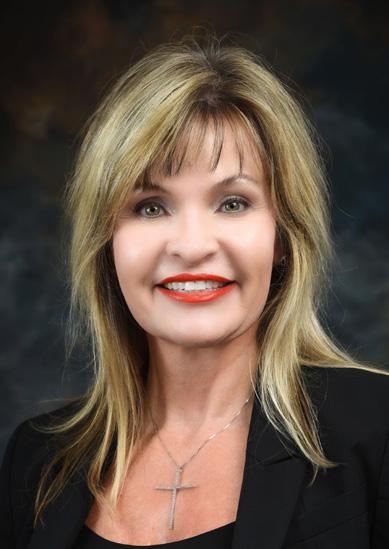
The Council for Leaders in Alabama Schools (CLAS) is proud to announce Dr. Annie Spike, Deputy Superintendent of Marshall County Schools, as the 2025–2026 PresidentElect. With over three decades of service in Alabama’s public schools, Dr. Spike brings a deep well of experience, strategic leadership, and a lasting commitment to student success.
Dr. Spike has served as Deputy Superintendent of Marshall County Schools since 2019, following a 20-year tenure as the district’s Special Education Supervisor. Her career also includes impactful roles in Blount County Schools as a 504/At-Risk Contact and as a classroom teacher. Her service reflects a passion for inclusive education, student support systems, and collaborative leadership.
A dedicated CLAS member since 2002, Dr. Spike has served on the CLAS Board since 2017 and currently acts as the CLAS Membership Coordinator for Marshall
A lifelong learner and seasoned administrator, Dr. Thompson holds a Doctorate, Educational Specialist, and Master’s in Educational Administration from Samford University, along with a Bachelor of Science from Birmingham-Southern College. Her professional journey includes key leadership roles such as Chief of Teaching & Learning at Richland County School District, Assistant Superintendent for Kansas City Public Schools, and Director of Curriculum & Instruction for Lowndes County Public Schools.
An active CLAS member since 2018, Dr. Thompson also maintains affiliations with the American Education Association and Delta Sigma Theta Sorority, Inc.
As CLAS President, Dr. Thompson brings a wealth of experience, strategic vision, and a strong voice for Alabama’s educational leaders. We are honored to have her at the helm and look forward to the direction and insight she will bring in the year ahead.
County. She also holds leadership positions in numerous professional organizations, including the Alabama Association of 504 Coordinators (ALA504), where she has served as President and currently serves as Past President and Executive Board Member. Additionally, she is a longtime executive board member of the Alabama Council of Administrators of Special Education (ALACASE), currently serving as Secretary.
Dr. Spike earned her Doctor of Education from Samford University in 2018. She also holds an Educational Specialist and Master’s degree from the University of Alabama at Birmingham, and a Bachelor of Science from Auburn University.
Her professional affiliations include the School Superintendents of Alabama (SSA), Council for Exceptional Children (CEC), and the Samford University Beeson Society. She is also a driving force in local initiatives, co-chairing the Marshall County Children’s Services Facilitation Team and serving on the Project SEARCH Steering Committee.
CLAS is honored to welcome Dr. Spike as its next President-Elect. Her experience and unwavering dedication to Alabama’s public education system make her an outstanding choice to lead the organization into the future. We look forward to her leadership as she prepares to assume the CLAS presidency for the 2026–2027 term.
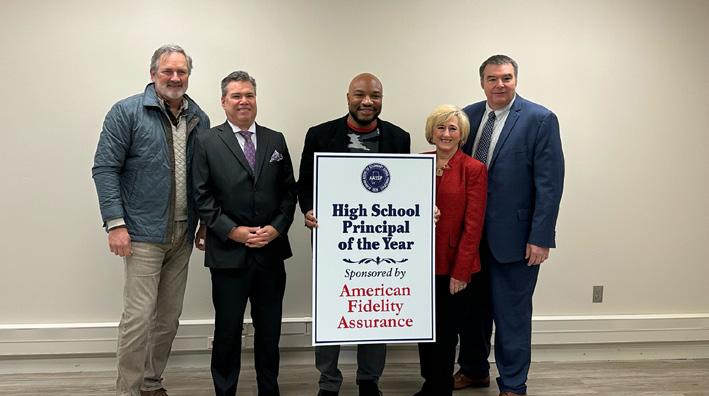
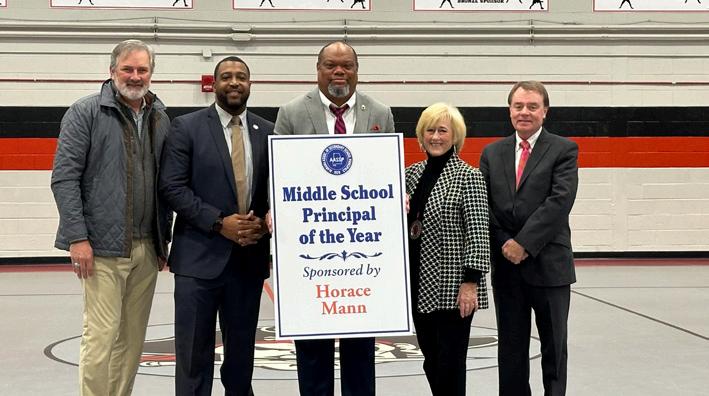

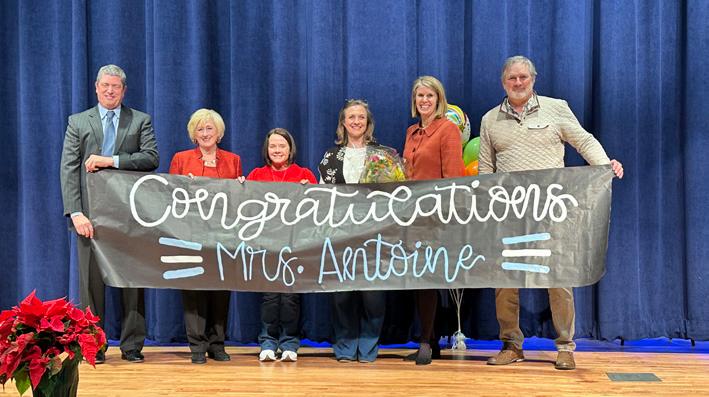

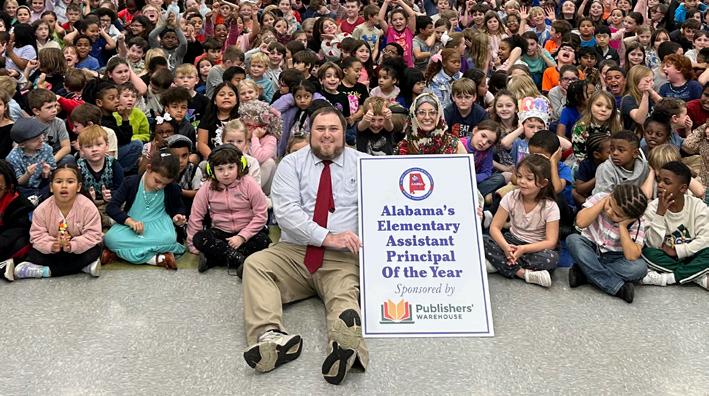
Mathew Epps, Principal
Career Technical Education Center
Shelby County Schools
Sponsor:
Anthony Sanders, Principal
Greensboro Middle School
Hale County Schools
Sponsor:

Stan Stokley, Principal
Saraland Elementary School
Saraland City Schools
Sponsor:
Elizabeth Antoine, Assistant Principal
Auburn High School
Auburn City Schools
Sponsor:
Jennifer Nabors, Assistant Principal
Calera Middle School
Shelby County Schools
Sponsor:
Stephen Phillips, Assistant Principal
Holly Hill Elementary School
Enterprise City Schools
Sponsor:

Dr. Farrell Seymore CLAS Executive Director
Dear CLAS Family,
I hope this letter and publication finds you well. I am excited to serve as the new CLAS Executive Director. I have been involved with CLAS and affiliates for most of my career. It is humbling to have the opportunity to walk in the footsteps of the many outstanding leaders who have preceded me. In particular, I want to thank Dr. Vic Wilson. He is a true friend and mentor from whom I have learned much. He has made this transition so easy.
Additionally, we have a wonderful staff at CLAS. They are a dedicated group of professionals who diligently
serve the membership. I am thankful for their graciousness in helping me in the new role.
I also want to thank YOU—our outstanding membership. I have received so many calls, emails, and messages wishing me well, but offering support. It truly means a lot.
For those who may not know me, I want to introduce myself. I am beginning my 29th year in education. I began my career as a seventhgrade science teacher in Opelika. I then served as a middle school assistant principal for five years, followed by four years as a middle school
principal. In 2011, I was named principal of Opelika High School where I served 11 years. In 2022, I was named Superintendent of Opelika City Schools, where I served for three years.
On a personal level, I have been married to Sarah Murray Seymore from Cave Spring, Georgia for 25 years. She is a speech language pathologist who also works in schools. We have two children, Anna and Patrick. Anna has just graduated from Florida State University with a degree in English Education and is currently in graduate school at FSU. My son Patrick is a sophomore at Auburn University seeking a degree in hospitality management.
Throughout my experience as an administrator, CLAS and its affiliate organizations have been a vital part of my career. I have learned so much from the wonderful professional development, the innovative ideas, and especially the relationships from the many colleagues and friends I have been blessed to know. It is my hope as Executive Director to give

back what this wonderful organization has given me. Education is all about relationships. CLAS has always had this as a cornerstone as well and it is evidenced in how we elevate the profession.
Thank you again for this opportunity. I am honored to serve alongside you in this capacity. Feel free to reach out at any time.
Have a great school year!


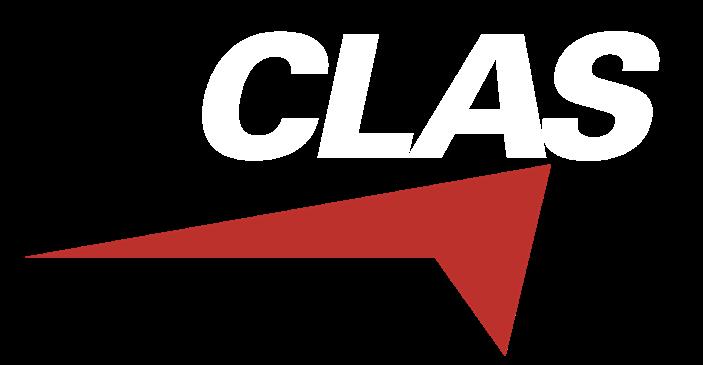



Greetings and salutations,
I hope this missive finds you well and enjoying your return to school. Some of us, including me, will be retired by the time you read this. I can’t believe it has been eight years since I wrote my first article for the CLAS School Leader. Time flies, and I have loved every minute as the CLAS executive director.
In July of 2017, I started work at CLAS, and not long thereafter I wrote my first article for the magazine. In the eight years since, I have had the pleasure of working with and for the best leaders in Alabama. I have also been fortunate to work with great people in the CLAS office. I cannot overstate how important the CLAS staff is to every CLAS member. We would not be the CLAS we are without Demica Sanders, Debbie Lee, Alyssa Godfrey, Tammy Coker, DeAnna Swindle, Anita Reid, Leslie Dennis, Katrina Akers, Linda Campanotta, Starr Wilson, and Whitney MillerNichols. Join me in thanking this great group for the wonderful work they do every day.
I have also been fortunate to work with a great board and executive committee. This year has been difficult on the executive committee due to the hiring of a new executive director. We were fortunate to have Dr. Michelle Washington as our CLAS President during this process. Her background in HR was very instrumental, and she did a wonderful job navigating the process. Thank you, Michelle. Likewise, Tony Sanders, Dr. Regina Thompson, Waller Martin, and Chris McCullar did a fabulous job leading during this process. Thank you, Chris, Regina, Waller, and Tony.
By now, you are probably aware that Farrell Seymore was chosen to be my successor. Dr. Farrell Seymore will be an amazing executive director for CLAS. His leadership, attention to detail, character, and work ethic will take CLAS to new heights. At every stop during his career, Farrell has been an excellent leader, and those under his care have thrived. I see more of the same for CLAS and CLAS members. Congrats, Farrell! You will do a great job with a great organization.
To the CLAS members, I say thank you. We would not be the organization we are without you. You have grown CLAS to record numbers because of your hard work, networking, collaboration, and desire for excellent professional learning. Many of you have chosen to become leaders in your affiliates, and I thank you for that too.


































































































Sincerely,


























































































I have not really retired; I have re-careered. I will be teaching some classes, delivering some leadership professional learning, and doing chores for Felecia. I will also be helping Mother at her house. I will also try to find some time to play golf and guitar, and to goof off. Just sayin’… Nonetheless, I am here for you if I can help in any way. You can find me at BR549. Ask for Junior.
Thank you for all you do for those under your care. You are rock stars in my book!
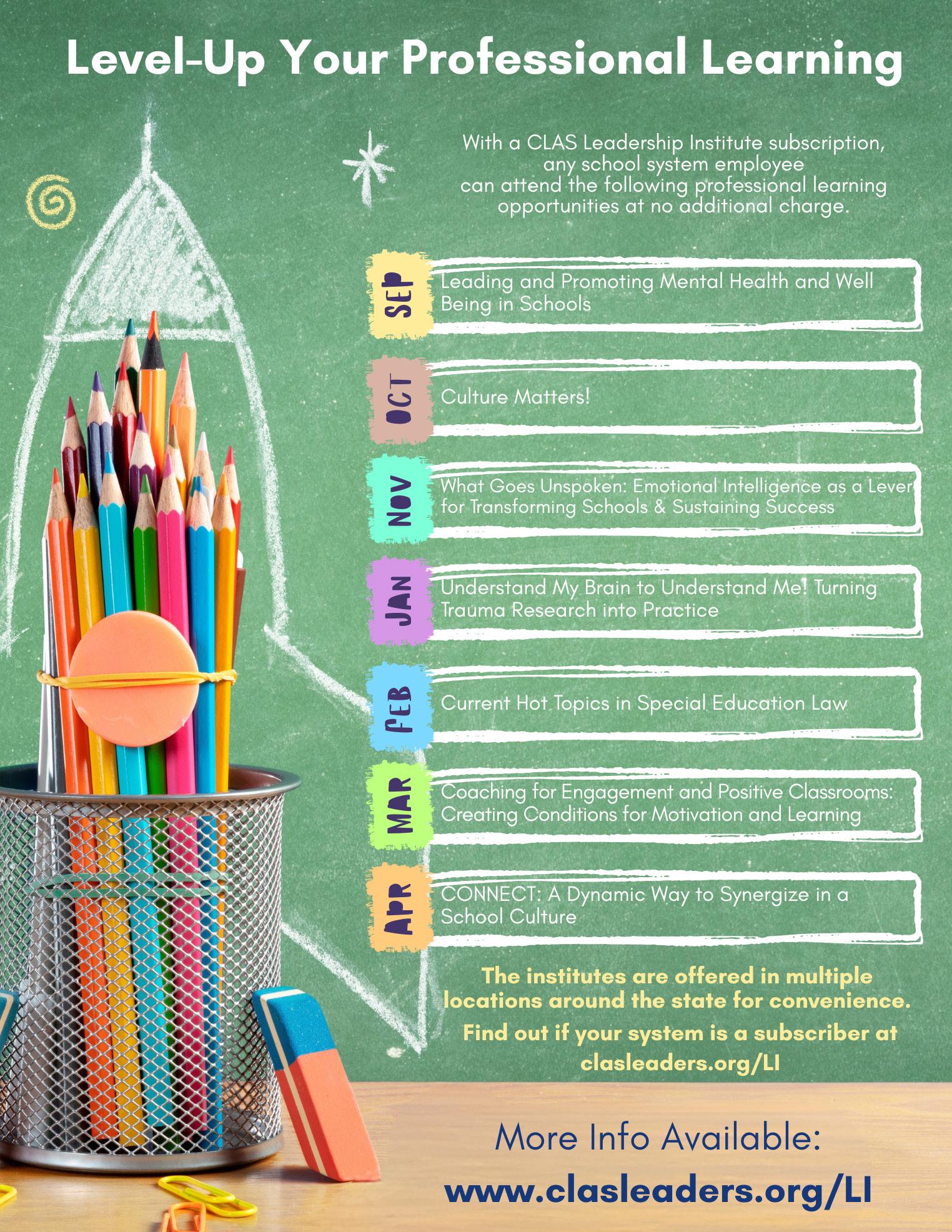




















Dr. Eric Mackey
Alabama State Superintendent of Education
If you followed education news during the Alabama Legislature’s 2025 session, you may have heard about the Rewarding Advancement in Student Excellence Act… or RAISE for short. It’s a new approach to school funding in Alabama that’s been years in the making and now it’s finally here.
I strongly supported the adaptation of the RAISE Act into law and I think it is going to play a significant role in shaping the future of education across our state. The RAISE Act is a new law that changes how public schools in Alabama receive state funding. This year’s Education Trust Fund Budget, the FY26 budget, is the largest in Alabama’s history. That means record investments in K-12, two-year, and four-year colleges.
To be clear, this law does not take away from the base funding schools already receive. That foundational support, built on Alabama’s Foundation Program, remains intact and strong. In fact, Alabama has one of the most progressive base-funding models in the country, and we’re keeping that in place. What’s new under RAISE is what’s called a weighted student funding formula.
Think of it as an extra layer on top of the base funding. A way to provide more support where it’s most needed. Governor Kay Ivey and the Alabama Legislature have already set aside $375 million to get this rolling over the next three years, and we expect it to grow from there. This weighted funding allows
Alabama to put more financial resources towards areas of learning that need an extra boost. In other words, students who need to support the most.
The RAISE Act introduces four targeted funding categories:
• Special Education
• Gifted Education
• English Language Learners (EL)
• Students Living in Poverty
In the past, we’ve funded most of these categories through separate line items. But this new method is different; I think it’s better. Now, the amount of funding a school gets will be based on the actual number of students in each of those categories. It’s a more transparent, accountable, and direct way to fund student needs.
For example, if a district has 100 English language learners (EL). Under RAISE, the funding for those students is calculated using a specific multiplier tied to EL needs. That money must then be used to directly support those students. That may mean hiring more EL teachers, purchasing learning software, or offering extra tutoring.
That same structure applies to gifted students, students with special needs, and those from economically disadvantaged households. And

here’s something important: for the first time, Alabama will include poverty as a weighted funding category. That’s a major step forward. We’ve never had a funding weight tied directly to student poverty before. This will help schools in low-income areas get more resources to support their students in meaningful ways.
Ultimately, it comes down to a basic principle: funding should follow students and reflect their specific needs. For years, we’ve been spreading out limited pots of money across districts based on estimated counts. But those estimates didn’t always match up with the reality on the ground. This new approach creates a direct line between student demographics and school funding. That means if your district sees a rise in special education students or EL learners, your funding should rise too. Simple math, but powerful accountability.
“Simple math…. But powerful accountability.”
It also holds the state accountable. Gov. Ivey and Alabama legislators have been incredibly generous towards education in our state. Now, they can clearly see where the needs are growing, and where funding needs to follow.
Poverty is not equally distributed. Some school systems face far higher rates of economic hardship, which affects everything from attendance to access to internet at home. Some of the biggest changes will be seen in communities
where needs are concentrated. In certain parts of the state, EL students are the fastest-growing student population. These students need language support before they can access the full curriculum.
Gifted students, and those in special education, are more evenly distributed across the state, so the funding shifts there will be more uniform. This new law helps us make sure students aren’t overlooked just because they live in a more challenged community or attend a school that hasn’t traditionally gotten as much attention.
Another aspect to consider… we’re not just thinking about the classroom. We’re also investing in out-ofschool learning time, with $30 million allocated for summer school, after-school programs, and beforeschool care. These are critical supports, especially in the wake of the pandemic, where we learned that what happens outside the classroom can be just as important as what happens inside it.
And I’m especially proud that the legislature fully funded our requests for literacy and numeracy support. That includes classroom materials, teacher coaching, professional development, and summer enrichment programs. Our students deserve to read well and think mathematically. Now we have the funding to back that up.
There’s no one-size-fits-all solution in education. Every community in Alabama is different. Every school has its own mix of needs, strengths, and challenges. The beauty of the RAISE Act is that it recognizes those differences and puts real money where it is needed most. It’s not perfect, and it won’t fix everything overnight. But it is a major step forward, and I believe it positions us to do something every educator in Alabama wants: to provide every student in Alabama with the opportunity to learn, grow, and thrive.
I’m proud of the work our Governor, State School Board, elected officials, teachers, principals, and superintendents are doing every day. With RAISE as the new funding structure, I believe we’ll have even more tools to support the mission of improving academic achievement across the state.








The CLAS Banner School Award originated in 2001 with the purpose of identifying, recognizing, and publicizing schools with outstanding educational programs which serve as models across our state. Recognition is among all State School Board districts with exemplary schools selected from each district as a CLAS School of Distinction. Eight Banner Schools are selected from the Schools of Distinction, one from each district. The Schools of Distinction were honored at an awards luncheon in May where the Banner Schools were announced. The honored principals and superintendents were recognized and presented with a CLAS banner to display in their school signifying this distinguished honor

Place-Based Science
Gulf Shores City Schools

Twilight
Tarrant City Schools
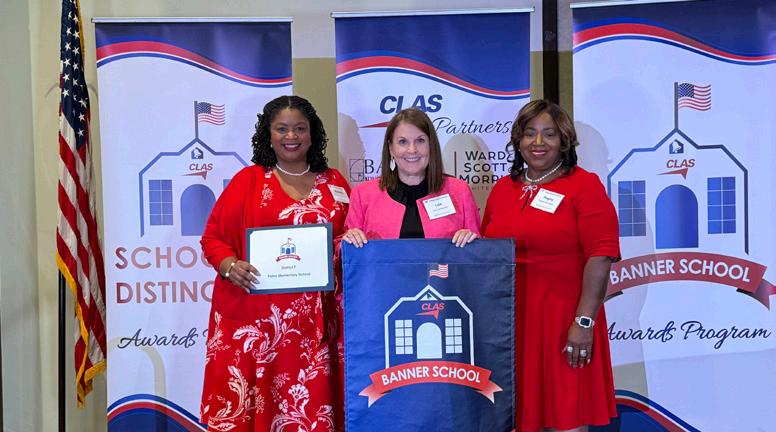
Learning
Trussville City Schools

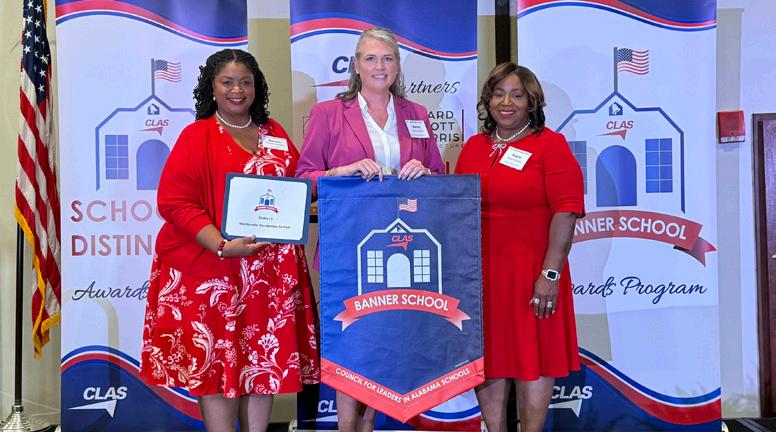
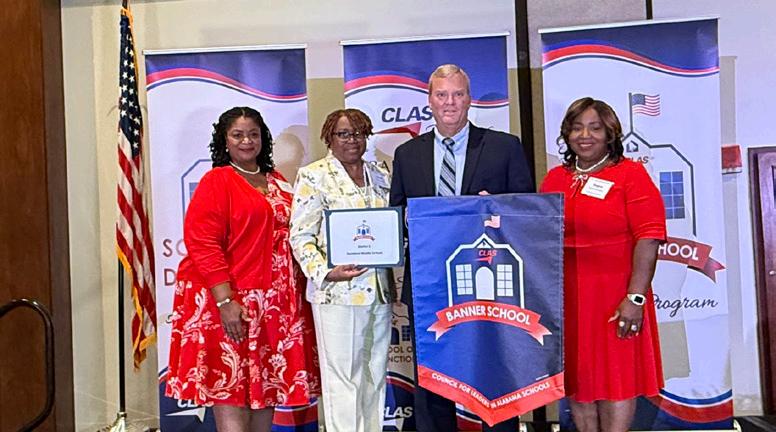
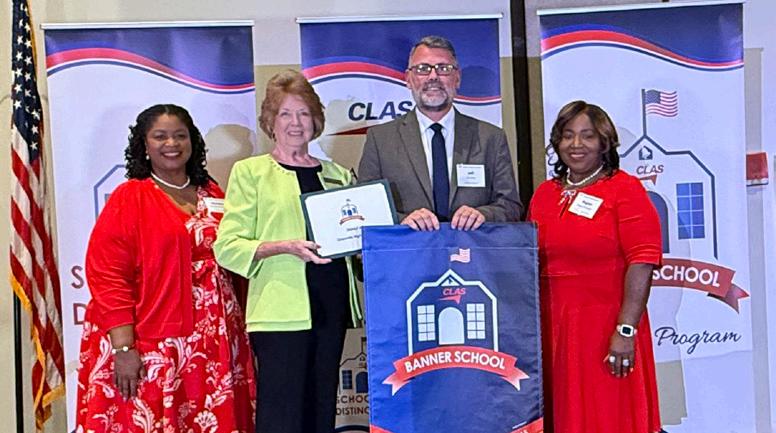
Individualized
Oneonta
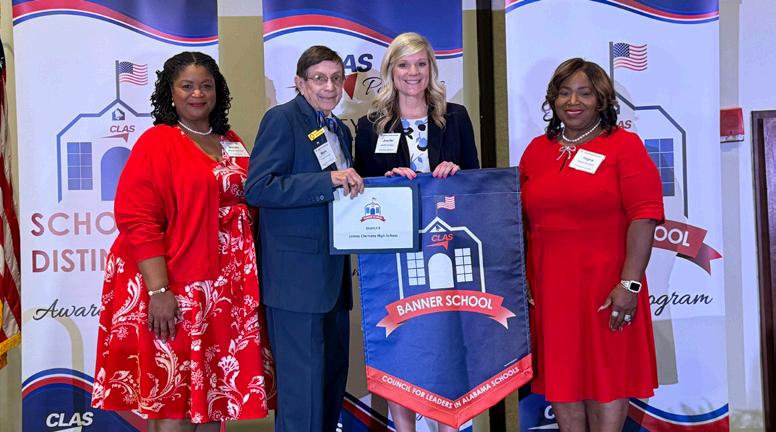



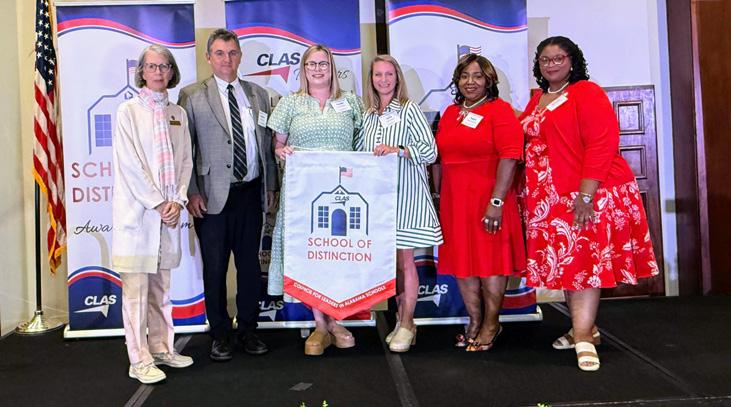
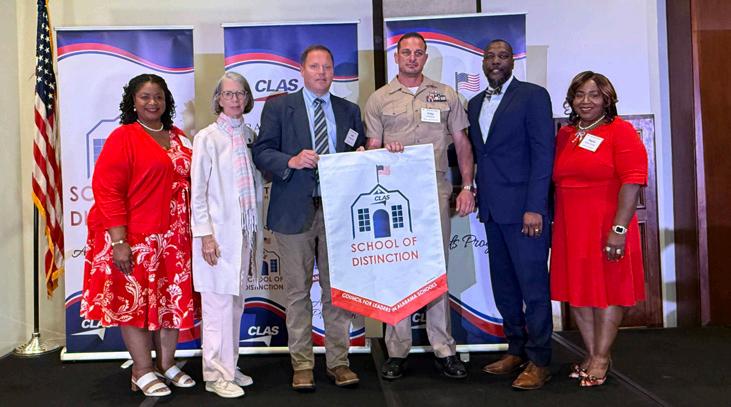
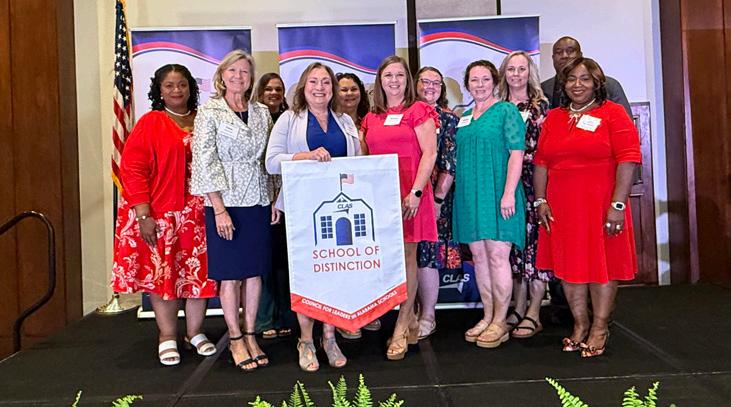



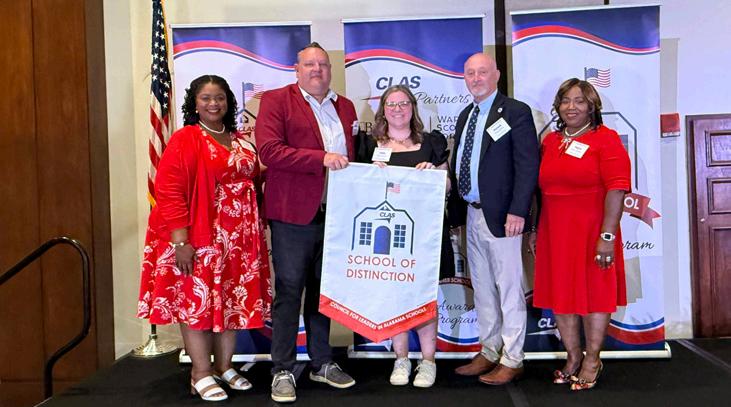

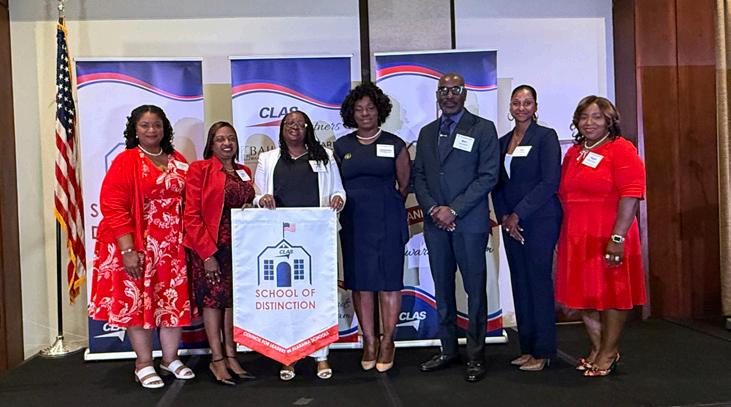


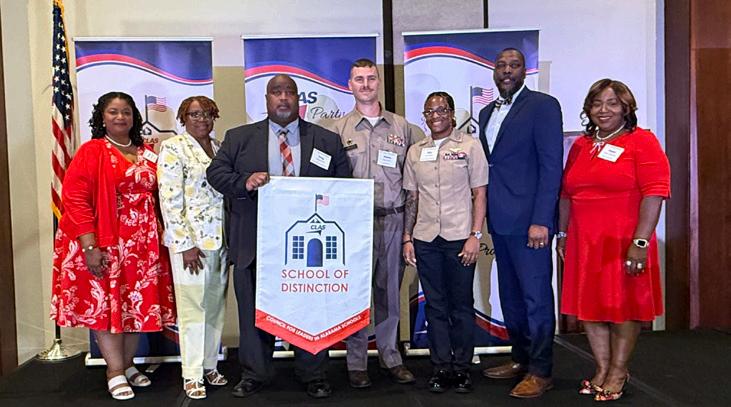

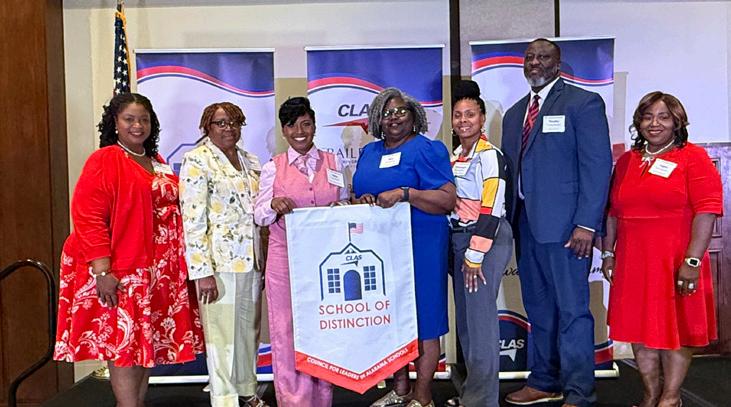
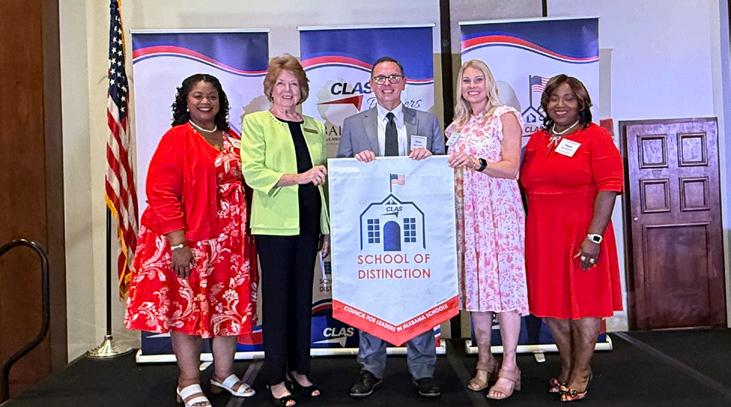
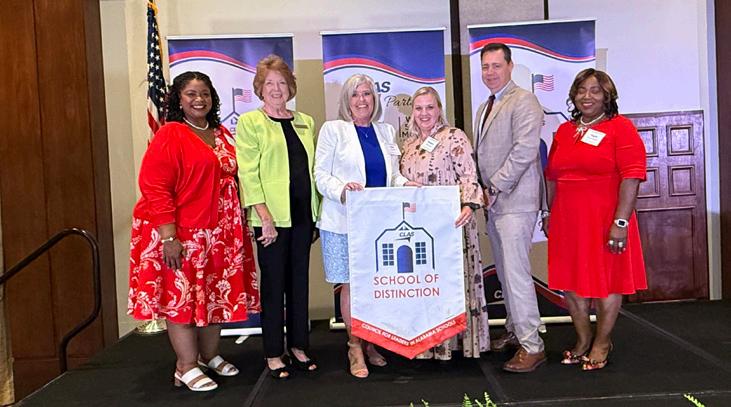
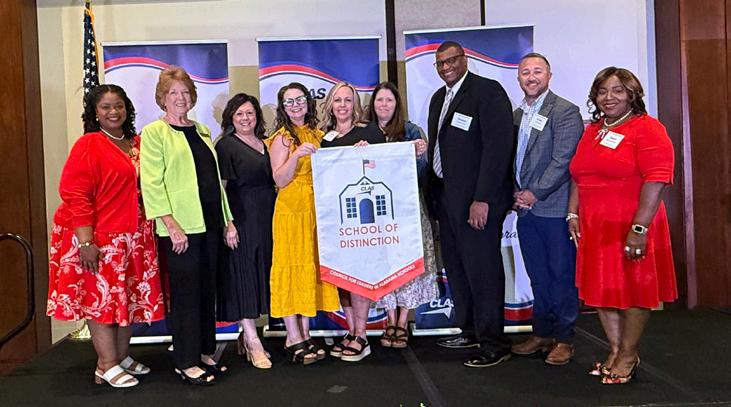
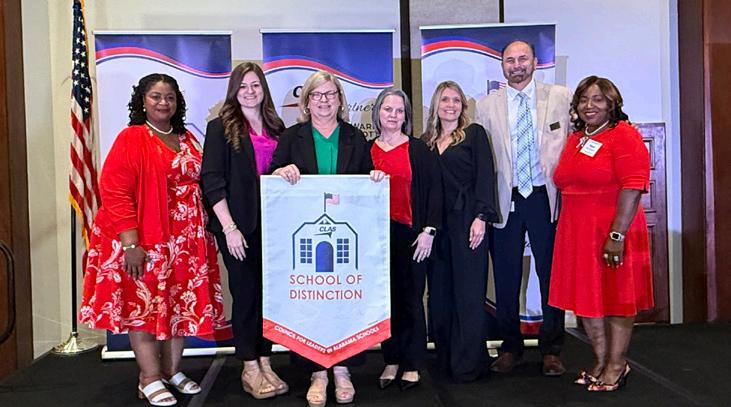

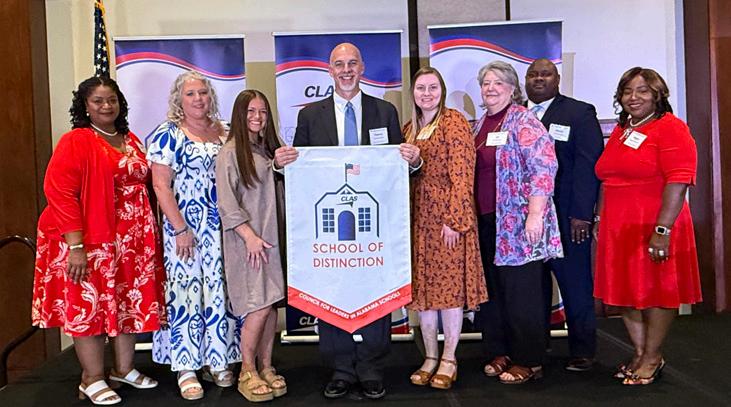
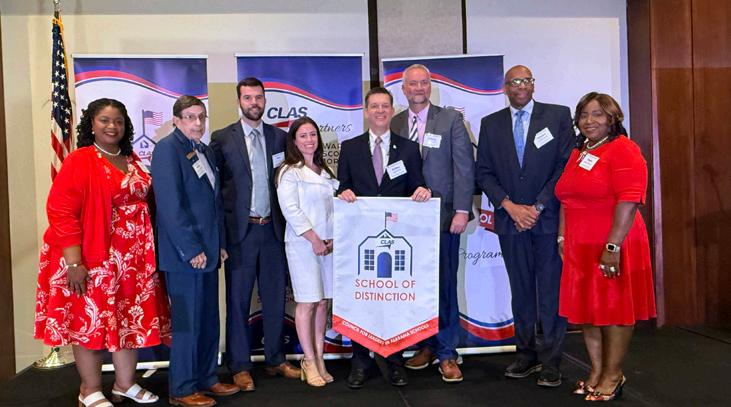
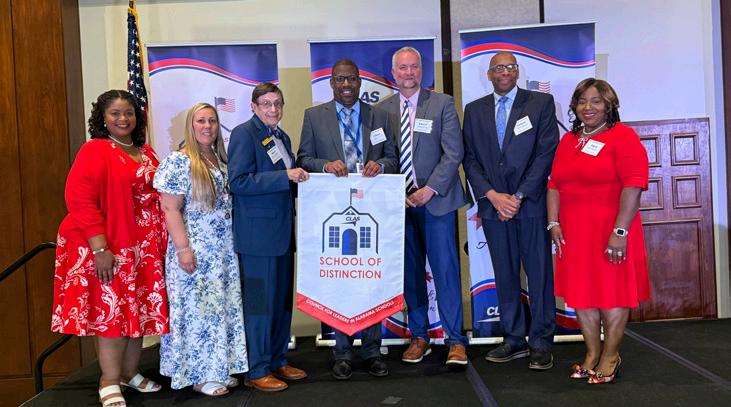
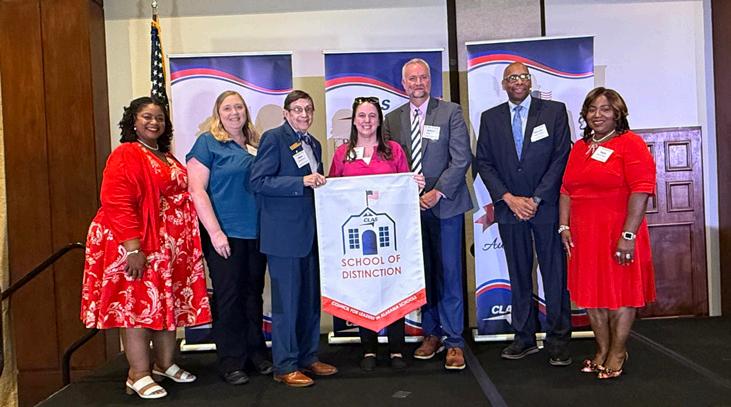


The school board in Escambia County, Florida, decided to remove or restrict access to several books in their school libraries. Five plaintiff groups sued the school board: the PEN American Center, Inc.; author plaintiffs who wrote the books; a book publisher; plaintiff parents; and plaintiff students. The five groups brought three claims. The first claim was viewpoint discrimination under the First Amendment. The second claim was violation of a right to receive information under the First Amendment. The third claim was an unequal protection claim under the Fourteenth Amendment. (PEN American is a nonprofit organization begun in 1922 to raise awareness in the United States and worldwide for free expression through literature.)
As the defendant, the school board filed a motion for the court to dismiss the case. After the parties were given an opportunity to present an oral argument on the motion on January 10, 2024, the district court judge issued an oral opinion, then memorialized his rulings in a written order two days later. This stage of the progress of the court case was not reported in the national reporter system until sixteen months later, on May 22, 2025. It is cited as PEN American Center, Inc., v. Escambia County School Board, 711 F.Supp.3d 1325, 433 Ed. Law. Rep. [749] (N.D.Fla. 2024) and it is the starting place for this commentary.
The defendant school board brought four arguments to support its motion to dismiss. First, it argued that the pleading was an impermissible shotgun pleading, because it did not give the school board adequate notice of the claims against it and the grounds upon which each claim rests. Second, it argued that none of the plaintiffs have standing. Third, it argued that the claims are moot based on Florida law. Fourth, the complaint failed to state any plausible claims for relief.
For the first argument, the district court judge noted that in oral arguments the school district’s counsel illustrated a clear understanding of the claims being brought and the grounds upon which those claims rest. For the second argument, the judge noted that the authors and publisher have a First Amendment interest that was impaired by the removal or restriction of the books they produced and the loss of a previously available forum for the speech in those books. PEN has associational standing because the interests implicated by the school board’s actions are germane to the purpose of the organization. Students have a right to sue for the loss of access to a variety of viewpoints and parents have a right to sue on behalf of their children.
For the third argument, the school board argued that the plaintiffs’ claims were moot under state law. Florida had created a special magistrate process that is available to parents when a
Continued on Page 27

Dr. Amy Dagley Associate Professor, University of Alabama at Birmingham and Dr. Dave Dagley
Professor Emeritus,
University of Alabama

Effective SY 2025-26, the Creating Hope & Opportunity for Our Students’ Education Act of 2024 (“CHOOSE Act”) establishes Education Savings Accounts (“ESAs”) to fund qualifying educational expenses for private school and homeschool services. Generally, eligible expenses cover various private, online, and homeschool options, as well as public school offerings that charge tuition.
Qualifying educational expenses also include services for IDEA and 504-covered students with disabilities (“SWDs”) from a licensed or accredited practitioner, effectively allowing parents to use ESA funds to pay for private services for SWDs, as well as for “contracted services provided by a public school district.” Certain income caps apply to families for the first two school years ESAs are available. Beginning in SY 2027-2028, any family is eligible without income limitations, and, every year, the first 500 slots for ESAs are reserved for SWDs regardless of income.
Regarding district obligations to SWDs participating in the CHOOSE Act program, Section 3(h) of the Act provides that a “specialneeds student” remains eligible to receive special education or similar services from the resident school district “as provided by federal or state law.” The CHOOSE Act does not specify, however, which requirements of federal law and which district obligations continue.
Attending Private Schools Located within the District
The CHOOSE Act treats “special-needs students” as parentally placed private school students (“PPPSS”) under IDEA. For this purpose, PPPSS are SWDs whose parents have chosen to place them in a private school but for whom there is no dispute about FAPE to
Leslie A. Allen, Esq.,
David “Butch” Sargent, Esq., and
Julie J. Weatherly, Esq.
IDEA obligates districts to fulfill certain child find requirements to PPPSS attending private schools within their jurisdiction whether or not a student is a resident. In doing so, non-resident districts where private schools are located must undertake child find activities similar to activities for resident students and within a comparable timeframe. Districts where private schools are located must also reevaluate PPPSS in accordance with IDEA’s reevaluation requirements at least once every three years, where a parent or teacher requests an evaluation, or “when warranted.”
Districts where the private schools are located additionally must maintain an accurate count of the number of IDEA-eligible students enrolled in private schools within the district and calculate a proportionate share of IDEA Part B funds to spend annually for “equitable services” to PPPSS with disabilities. Further, the district where the private school is located is responsible for maintaining and reporting to ALSDE the number of PPPSS evaluated, the number determined IDEA-eligible, and the number receiving equitable services from the district.
While districts where private schools are located have no obligation to offer FAPE or IEPs to PPPSS, they must spend a proportionate share of Part B funds to provide “equitable services” to them, which could include direct and/or indirect services. Equitable services offered to PPPSS by districts are identified in the district’s LEA Plan and, in Alabama, traditionally include the provision of speech only, speech-language only, or speech-language and OT. Equitable services for individual PPPSS must be documented in a “Services Plan.”
Under IDEA, the district where a student resides is always responsible for making FAPE available to its SWDs and conducting child find activities, such as evaluations for special education services, even if a resident student is placed in a private school outside the district. Thus, it is possible that parents of PPPSS could request evaluations from the district where the private school is located and from the resident district. In that circumstance, both districts would need to conduct evaluations if either district
suspects an IDEA disability and need for special education, although the purpose of the evaluations are different. The resident district must evaluate to make FAPE available to the student. The district where the private school is located must evaluate to determine whether the student is eligible for equitable services.
For IDEA-eligible PPPSS, the resident district is required to make an offer of FAPE (and provide it if the student is enrolled), unless the parent makes clear their intent to keep the student in the private school. Once the resident district makes FAPE available, if the parent makes clear the intention not to accept that offer and keep the student in a private school, the resident district is not obligated to contact the parent to develop an IEP for the child for the following year or thereafter. If a parent accepts the resident district’s offer of FAPE and enrolls the child, which parents can do at any time, the resident district must make FAPE available by developing an IEP for the student.
“Special-needs students” under the CHOOSE Act also include students who have 504 Plans. Although 504 includes a child find requirement similar to IDEA’s for resident students, it provides nothing requiring services for PPPSS. The resident district must fulfill its 504 child find obligation to evaluate PPPSS under 504 if there is reason to believe a student has a disability and need for accommodations. However, neither a resident nor non-resident district would be required to provide “equitable services” or a “services plan,” because 504 contains no such provisions for PPPSS. Obviously, though, the resident district would make “504 FAPE” available to 504-eligible PPPSS if a parent requests an evaluation and returns a student to public school.
Whether homeschool students are considered PPPSS depends upon state law. While the child find obligation continues to fall on resident districts, students in Alabama who are homeschooled are not entitled to any services unless the homeschool is a private school registered with ALSDE. To our knowledge, no homeschool programs are currently registered as private schools.
In 2013, the CLAS Board of Directors established the Certified Instructional Leader (CIL) program. This program is designed to identify school or district administrators who demonstrate the knowledge and skills which are essential to the practice of effective instructional leadership.
For the eleventh year of this program, 15 participants were selected after an extensive application and review process. The 2024-2025 cohort began in June 2024 with quarterly face-toface meetings. Candidates were required to implement learned content in their school and/or district and meet benchmarks on student growth and achievement, school culture, strategic management, effective instructional practices, and ethical leadership.
A CIL Commission was established to be an independent certifying body, which is responsible for the governance of the program, policies, and standards related to the CIL credential. This unique CIL program is administered by members of the CLAS staff who implement the policies. The CIL faculty delivers the identified content.
After completing extensive coursework and providing evidence of systemic, systemized, job-embedded implementation for competent instructional leadership, CIL participants met with the CIL Commission to determine their CIL credential status as “Accepted” or “Not Accepted: Revisions Needed.”
Ramona Robinson and Dr. Linda Felton-Smith served as faculty members. The 2024-2025 CIL Commission members were Daniel Barrentine, Veronica Coleman, Charles Gardner, Jason Golden, Erik Kirkman, April McCutcheon, Orletta Rush, and Alice Turney.
If you are interested in pursuing the Certified Instructional Leader (CIL) credential, please visit the CIL webpage at clasleaders.org/CIL for detailed information. The application process will open in April 2026 for the 2026-2027 cohort.
The Certified Instructional Leader credentials are awarded annually during the Awards Luncheon at the CLAS Convention.The following individuals received their Certified Instructional Leader credential this year:
Jennifer Colvard-Davis
Florence Freshman Center, Florence City
Demond Garth
Austin High, Decatur City
Lisa Harris
Beauregard Elementary, Lee County
Loni Hodge
Grantswood Community Elementary, Jefferson County
Matt Humphrey
Dale County High, Dale County
Teresha Jones
Central High, Tuscaloosa City
Mallory Kincaid
R.E. Thompson Intermediate, Tuscumbia City
Lori Moss
Highland Elementary, Etowah County
Tiffany Parham
Southlawn Middle, Montgomery County
Jami Rainey
Northridge Middle, Tuscaloosa City
Ross Reed
Auburn Junior High, Auburn City
Keith Trawick
Monrovia Middle, Madison County
Clay Webber
Asbury High, Marshall County

local school board denies an objection to a book being made available in a school setting. (See, FLA. STAT. § 10006.28(2) (a)6.) The situation addressed in legislation is the opposite to the situation in this case. In the legislation a parent is petitioning the school board to remove a book. In this case the board has limited the access to books by students. Consequently, Florida law does not make the case moot. And for the fourth argument, all plaintiffs have standing to sue. Having “standing” opens the door to the courthouse, but it isn’t dispositive of the merits of the case.
The district court judge denied the motion to dismiss on the first two claims, that the school board’s actions implicated both viewpoint discrimination and the right to receive information, both under the First Amendment. However, the judge dismissed the third claim, that the school board had violated equal protection under the Fourteenth Amendment.
The district court judge in this case gave some thought to what the legal standard should be in measuring the school board’s decision to restrict or remove library books. At one point he mentioned a court case from 1982, Board of Education, Island Trees Union Free School District No. 26 v. Pico, 457 U.S. 853, 102 S.Ct. 2799 (1982). Pico was the first and only time the U.S. Supreme Court heard a case about a school board’s decision to remove library books from the school library. Unfortunately, Pico was a plurality opinion, meaning that there was no majority opinion, with at least five justices signing on to the decision. Consequently, Pico has little precedential value. However, the Pico plurality stressed the distinction between school library books and instructional materials in the curriculum. School libraries are unique because they are a place where students can engage in voluntary inquiry
and they provide an opportunity for students to broaden their horizons and seek maturity in their understanding of more complex subjects.
The district court judge in the PEN case then wrote the following about what the legal standard should be:
The applicable legal standard for evaluating alleged First Amendment violations in the school library context is not entire clear, but the common theme in all of the potentially relevant standards (e.g., Pico plurality, Hazelwood, nonpublic forum) is that school officials cannot remove books solely because they disagree with the views expressed in the books but they can make content-based removal decisions based on legitimate pedagogical concerns including things like pornographic or sexual content, vulgar or offensive language, gross factual inaccuracies, and educational unsuitability for certain grade levels. 711 F.Supp.3d at 1331.
The district court judge closed his order with an expression of encouragement for the parties to discuss potential ways to resolve or narrow this case to avoid the time, expense, and uncertainty involved in the litigation process. Advice given in law commentaries after Pico in 1982 suggested that book removal decisions might be better accomplished by creating committees of education professionals to evaluate requests to remove or restrict access to school library books, judged against a legal standard similar to the one articulated above, followed by a vote by the school board concerning the committee’s recommendation. We believe that is still good advice.

Whitney Miller-Nichols
CLAS Director of Governmental Relations

Every school year brings with it new programs and regulations as a result of legislative action, and the 2025-26 school year is no different. This school year will see several recent laws implemented in Alabama’s public schools:
• FOCUS Act (HB166/Act 2025-386): School systems will have to implement a wireless communication device policy that complies with the FOCUS Act, starting with the 2025-26 school year. Access the ALSDE FOCUS Act memo here. Each school’s principal is responsible for ensuring consistent compliance with the FOCUS Act and local board policy.
o The school system must prohibit student wireless communication device usage during school hours, with some exceptions (lines 29-69).
o Each local board of education must adopt a policy implementing this ban by July 1, 2025. The policy must include consequences for violation of the ban, and it should incorporate guidelines for the exceptions allowed by law (lines 70-76).
o By July 1, 2025, each local board of education must adopt an internet safety policy to govern student
internet use on devices owned by the system. There are certain regulations that must be included in the policy, including protections for students using direct electronic communication like chat rooms or messaging tools (lines 77-99).
o By June 1, 2026, and annually thereafter, each public school’s certificated faculty must complete a survey assessing the school’s implementation of the ban policy. ALSDE must develop this survey by October 1, 2025 (lines 100-112).
o By July 1, 2025, ALSDE must develop an asynchronous web-based course to be delivered to students before they enter eighth grade. The course must be available for students in grades 8-12 to take (lines 116-146). Instructions for accessing the course are available in the ALSDE FOCUS Act memo.
• Paid Parental Leave (SB199/Act 2025-81): Starting July 1, 2025, eligible employees of a school system or state agency receive up to eight weeks of paid parental leave in a year. View this ALSDE memo for more details.
• Principal Act changes (SB303/Act 2025-286): While the Principal Act stipends for the 2025-2026 school year are funded, legislators this year changed criteria for school leaders to receive the Principal Act additional stipend going forward. Only schools that satisfy one or more of the following criteria are eligible for the additional stipend:
o A school free/reduced lunch rate of 75% or more, determined through direct certification
o Comprehensive Support and Improvement school status
o D or F on the school report card
o Literacy/Numeracy Act full support schools
Look for an ALSDE memo about the 2025-26 school year Principal Act additional stipend at the end of the 2025 calendar year. Direct any questions about Principal Act stipends to principalact@alsde.edu.
• RAISE Act (SB305/Act 2025-257): The RAISE Act establishes a student-weighted funding initiative that allocates dollars to a system based on the number of students in specific categories. The category weights identified in the ETF budget bill are:

This funding will begin October 1 in the 2025-26 school year (FY2026).
The budget chairs shifted $58M from the ETF for the RAISE Program Fund, plus added $108M via the Educational Opportunities Reserve Fund for FY2026. Four ETF line items were reduced or removed to consolidate funds into the RAISE Program.
o ELL reduced by $16.5M and shifted to RAISE Program. $2M for Regional EL specialists will remain in the ELL line item.
o Local Boards At-Risk Student Program reduced by
$21.2M and shifted to RAISE Program (line zeroed out)
o ALSDE Local School and School System Academic Financial Improvement Program (At-Risk) reduced by $9.2M and shifted to RAISE Program. $5.5M remains in the line item for ALSDE-administered programs.
o Gifted Students Program reduced by $10.9M and shifted to RAISE Program. $1.4M remains in the line item for the Gifted Students Grant Program.
• Secondary student enrollment options:
o SB196/Act 2025-412 (Orr) permits high school juniors and seniors to enroll full-time at a college or university and take all credits needed for high school graduation as a dual enrollment/dual credit student, with the student’s high school awarding the student’s high school diploma. The law prohibits the student from taking any classes or participating in extracurricular activities at his/her high school campus once he/she begins the program. The law also establishes the Move on When Ready Fund in the State Treasury administered by the executive director of the Alabama Commission on Higher Education to pay the eligible institutions the lesser of either the actual cost of tuition, materials, and fees for the participating student’s costs at the institution; or the state K-12 per-pupil cost if the student was enrolled at the LEA. Students will be prohibited from receiving any additional financial aid for their full-time study at an ACCS institution while participating in the program. The school/LEA will not receive any state funding for the student in Year 2 of his/her participation. ALSDE is required to collaborate with ACCS and ACHE on a report to show the impact of the program, including student enrollment. Effective 10/1/2025.
o HB102/Act 2025-66 (Ross) requires a school system to allow students to enroll in any dual enrollment course at an ACCS site or university if that course is on the ALSDE dual credit list. The school must award high school credit if the student passes courses on the approved dual credit list. The school and the postsecondary institution must engage the student in course advising and mutually agree that the student is approved to take the identified courses. The 2024 course equivalency list can be viewed here. Read ALSDE guidance about the RAISE Act here. Effective 8/1/2025.
o HB266/Act 2025-326 (Woods) codifies in law and modifies the current Non-Traditional High School Diploma Option so that 18-year-olds will be eligible to withdraw from high school and enroll in ACCS’s Adult Education program to complete a traditional
Continued on Page 37
Mark Boardman Attorney
Boardman, Carr, Petelos, Watkins & Ogle & Howard, P.C.
As a CLAS member, you have friends in high places. May you legally introduce your adult children, who are seeking employment, networking, and interviewing, to your friends in high places? And are prospective employers restricted in their ability to employ your child merely because your child is related to you, a public official or public employee?
The Ethics Act is designed to prevent the use of public office for personal gain, thereby maintaining the integrity of government. The reward of a job, of course, would be personal gain. Whether you are a public employee or public official, your child is regulated by the Ethics Act.1
Yet, the Alabama Ethics Commission in Advisory Opinion 2015-11, wrote that the Ethics Act “does not prohibit the family members of public officials or public employees from seeking employment in their chosen field on the same terms as others who may apply.”2 The Ethics Commission wrote this to Alabama District 58 Representative Oliver Robinson. Representative Robinson’s daughter graduated with a law degree and decided that she, like her father, had an interest in business, government, politics, and law.
In looking for a job, his daughter wanted to meet a wide
1 If you are a public employee, not a public official, your child is regulated by the Ethics Act, if your child is your dependent. Alabama Code Section 36-25-1(14) 2 Advisory Opinion 2015-11, p. 5


range of people, including using Representative Robinson’s “connections,” meaning lobbyists, other government officials, and businesses. The Ethics Commission wrote that Representative Robinson could not use his position or influence to gain special treatment or favor for his daughter and could not include soliciting interviews on her behalf, but he could introduce her. The Ethics Commission noted

since it is not “uncommon in the job interviewing process for a prospective employer to take the interviewee to lunch or dinner in the course of a job interview,” the Ethics Commission said that activity was within the bounds of the law. “The point here is that she should be given the same opportunity as everyone else, free from influence from her father, and on terms that would apply to any job candidate applying for the job she’s interested in, but no more than that and irrespective of her father’s official position.”3 The Ethics Commission remarked that Representative Robinson would certainly introduce others who are not his daughter to his friends and contacts, just as you would for your students and friends. Accordingly, an introduction is an opportunity and benefit available to the public.4 Likewise, anything given by a friend which is motivated by friendship and not because of the recipient’s official position is excluded from the definition of a “thing of value.”5 Both of these exceptions allowed Representative Robinson to introduce his daughter to people who are his personal friends, and also those who “may simply be acquaintances with good reputations in their field or people he may respect.”6
Thus, you can “open doors” for your children and introduce them to the important people you know. You may also forward a resume or make additional introductions with others who might have thoughts on your child’s career opportunities.
Good luck to your child in his/her search for employment!
3 Advisory Opinion 2015-11, p. 6
4 Thus, such opportunities and benefits available to the public are carved out of the definition of “things of value.” Alabama Code Section 36-25-1(34)(b)(6)
5 Alabama Code 36-25-1(34)(b)(3)
6 Opinion 2015-11, p. 2
Dr. Demica Sanders
CLAS Director of Professional
Learning

The 2025 CLAS Convention brought energy, innovation, and bold leadership to center stage under this year’s dynamic theme: “Lights. Leadership. Action.” Held at the Mobile Convention Center, the three-day experience offered Alabama’s educational leaders a platform to spotlight what’s working, cast a vision for what’s next, and take bold action for student success. From powerful keynotes and engaging breakout sessions to unforgettable networking opportunities, this year’s convention was nothing short of transformative.
The convention opened with an electrifying keynote from Steve Pemberton, who reminded us of the importance of finding the anchors in our lives. He offered practical strategies to help define purpose, build meaningful connections, and lead with authenticity.
Weston Kieschnick followed with a groundbreaking roadmap for capturing student engagement from the very first moments of class and sustaining it to the end. Let’s just say… many of us will never look at the order of operations the same way again!
Jasmine Guy closed the convention with heartfelt gratitude for the work educators
do each day. Her inspiring words reminded us of our deeper purpose and the lasting impact of our leadership on students and communities.
True to its theme, the 2025 CLAS Convention put leadership in motion. A robust lineup of breakout sessions provided practical strategies on topics such as data-informed decision-making, instructional coaching, mental wellness, legal compliance, and community engagement. Attendees explored not just immediate challenges but also long-term strategies for building capacity, shaping culture, and fostering innovation in schools.
Networking remained a cornerstone of the event. From structured sessions to spontaneous hallway conversations, leaders shared success stories, exchanged ideas, and strengthened their professional networks.
A highlight of the convention was the annual President’s Reception, a joyful reminder that celebration has a rightful place in leadership. While Daphne—the beloved alter ego of the CLAS Professional Learning Director—didn’t take the dance floor this year, she certainly enjoyed herself, especially singing along to “Tell Me Something Good” with a spirited group of attendees. Rumor has it, she may have made a special appearance later that night at Veets!
In the Exhibit Hall, the convention’s theme came to life through innovation and collaboration. The red-carpet entrance welcomed attendees into a lively space filled with vendors, service providers, and education partners—all showcasing resources designed to strengthen Alabama’s schools.
From cutting-edge instructional tools and student wellness programs to professional development services and district planning supports, the exhibit space empowered leaders to take immediate action toward continuous improvement.
The centrally located registration and engagement area became more than a check-in point—it was a collaborative hub for door prizes, informal Q&A, music, and meaningful dialogue. Attendees didn’t
just leave with brochures—they left with actionable ideas, new connections, and renewed energy.
As the final curtain closed, the 2025 CLAS Convention delivered on its promise: Lights. Camera. Leadership. More than a theme, it was a call to action—urging Alabama’s school leaders to illuminate what matters most, lead with intention, and take bold steps toward shaping the future of education.
As attendees returned to their districts, they carried more than just professional learning—they returned with clarity, confidence, and community. The road ahead is bright, and the lights leading the way are the dedicated leaders of Alabama’s schools.
Here’s to another year of action—and to all the leaders who keep the light shining.

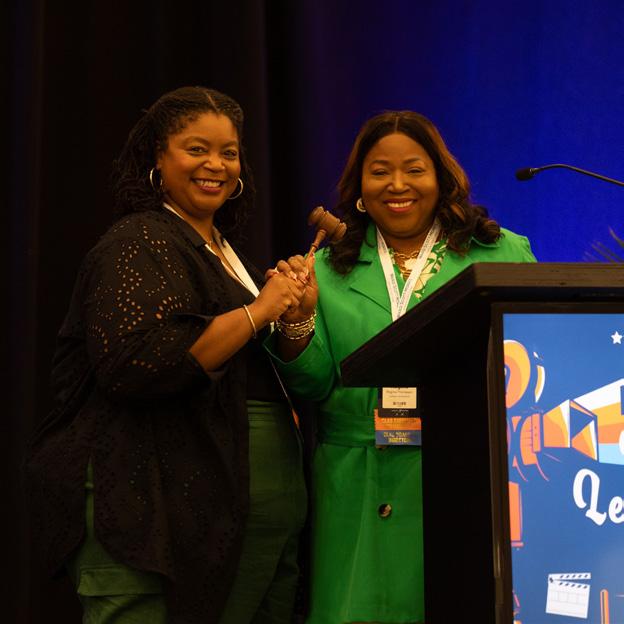

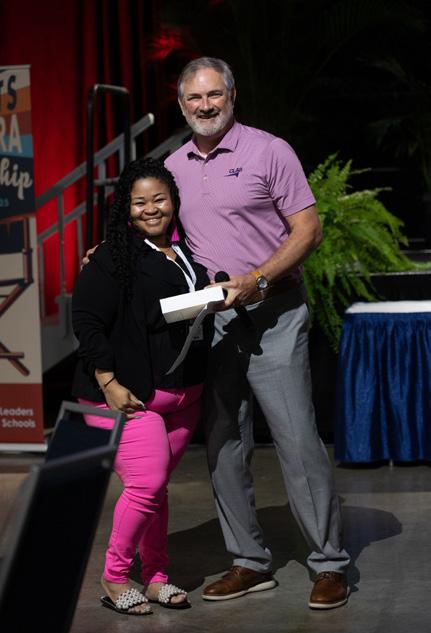
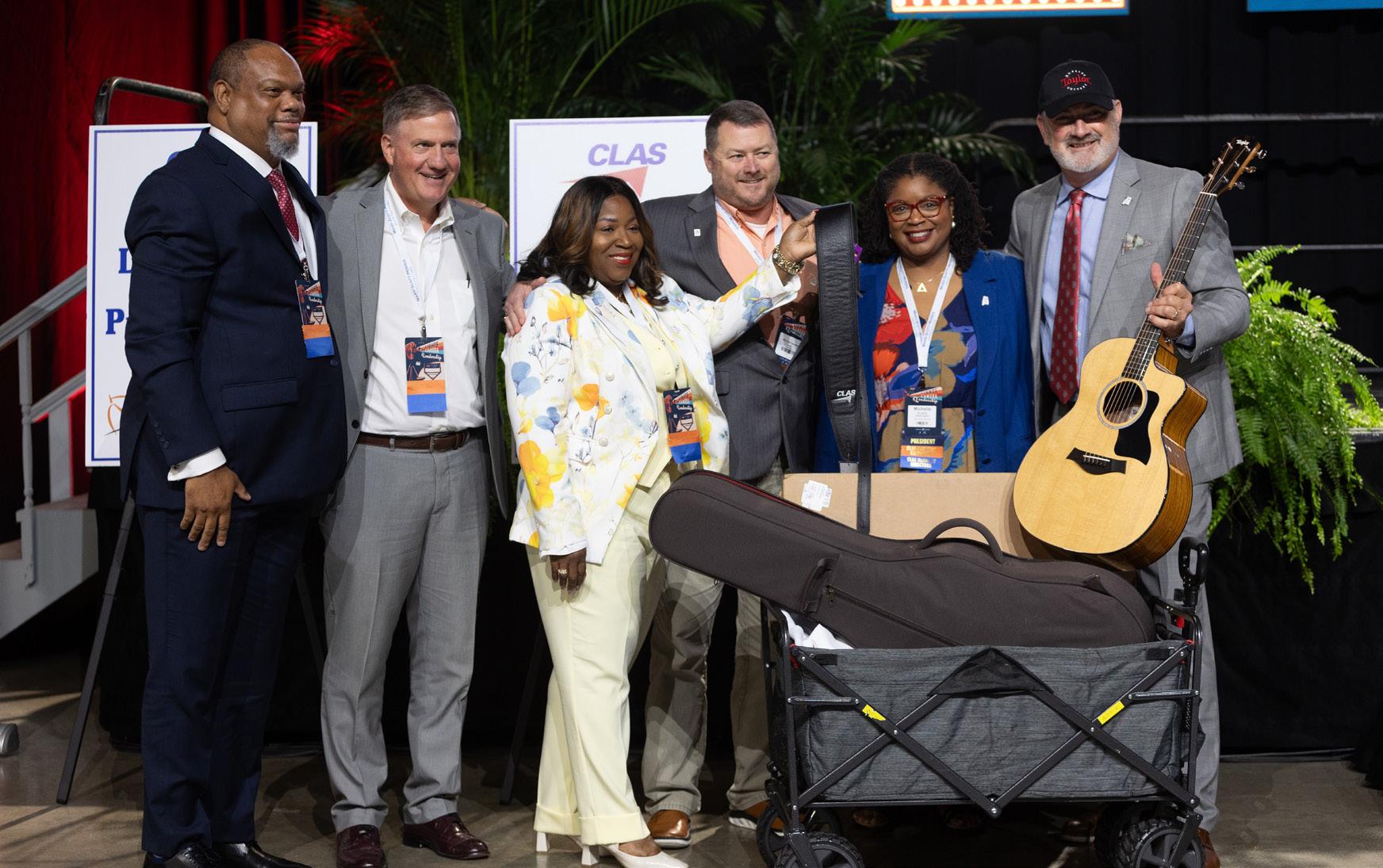
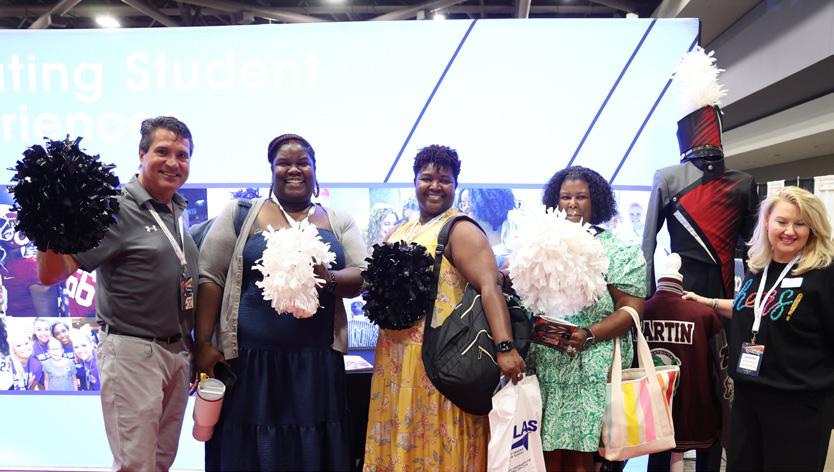

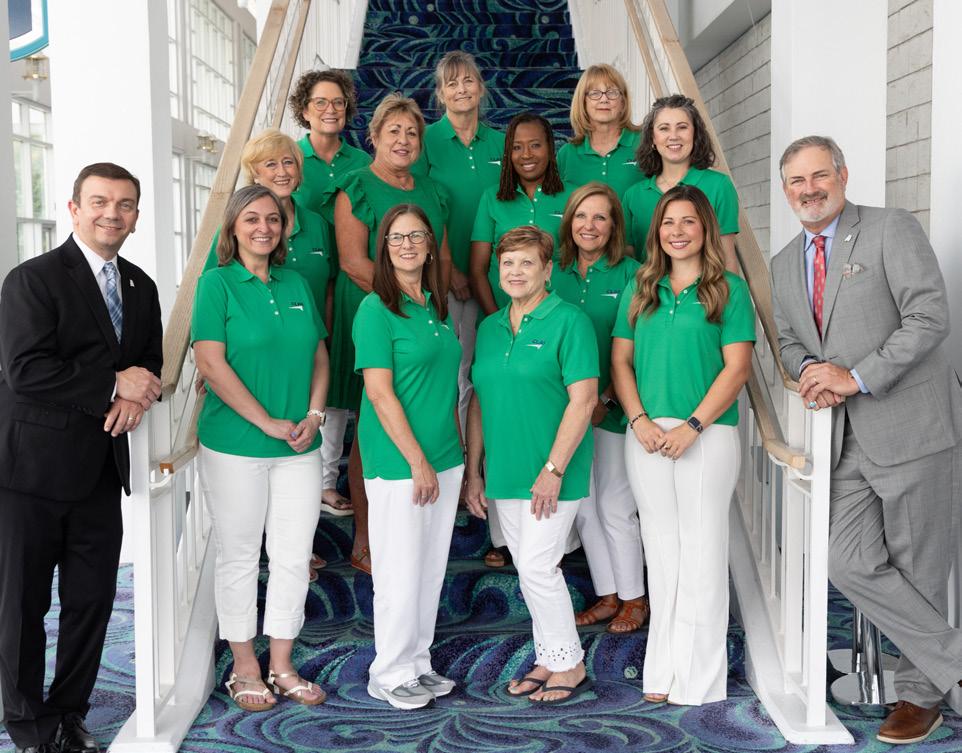


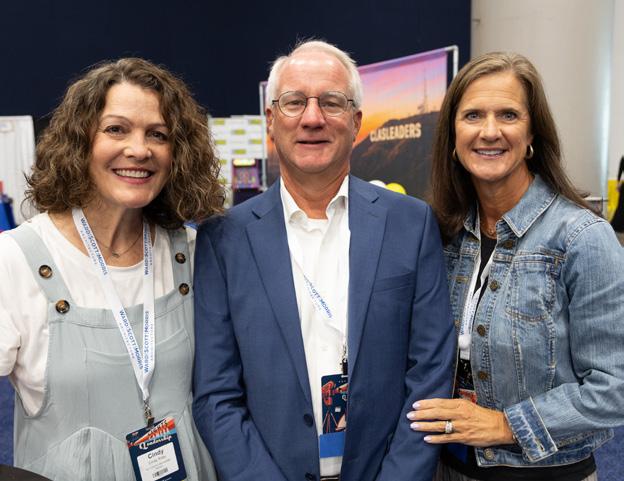

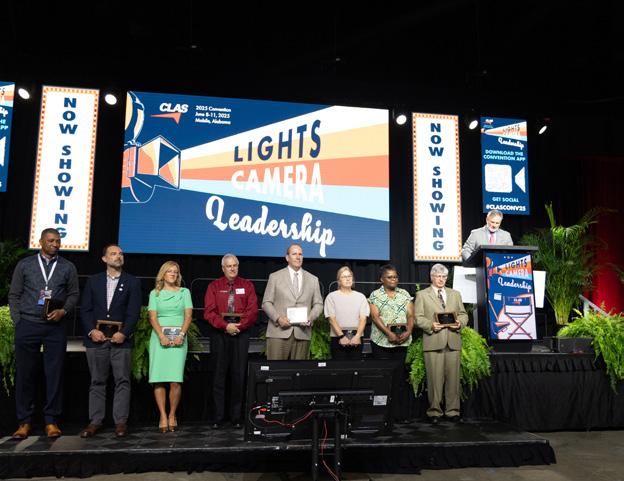
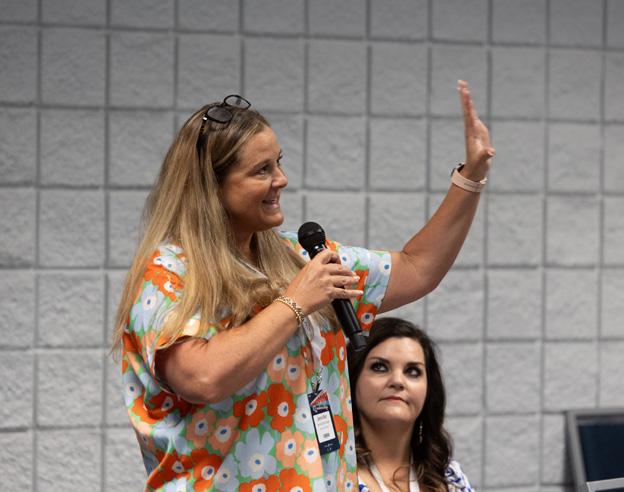


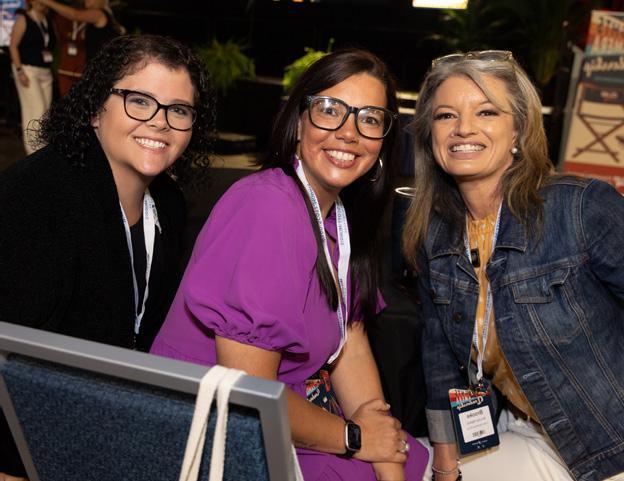

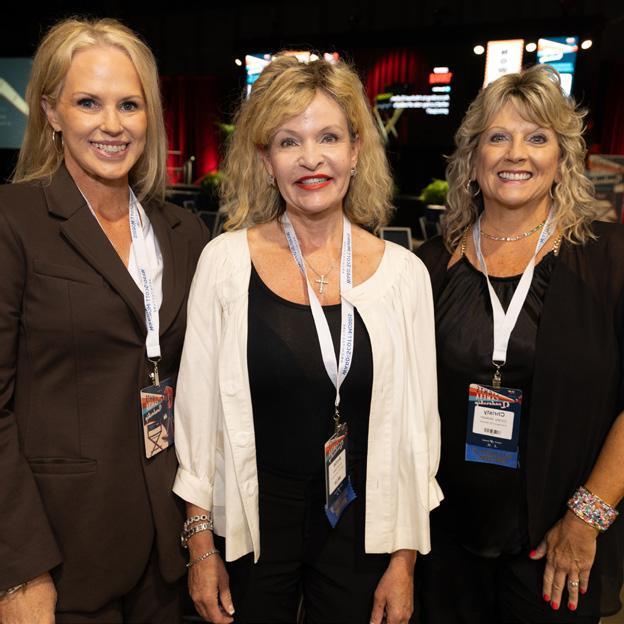

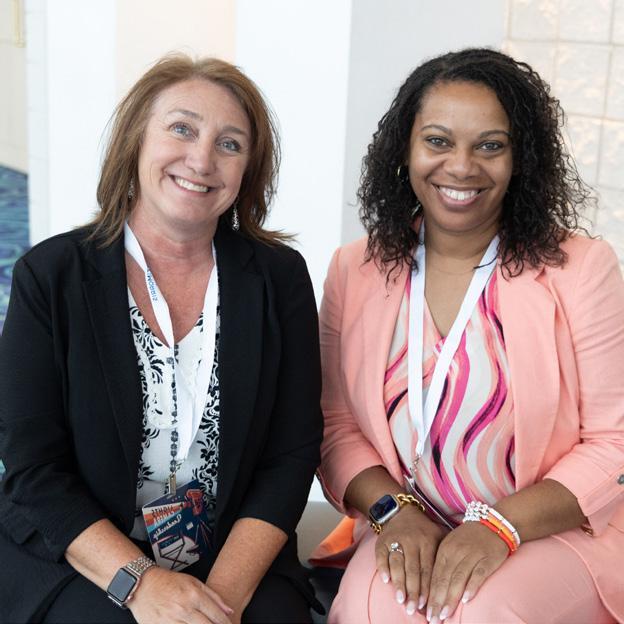
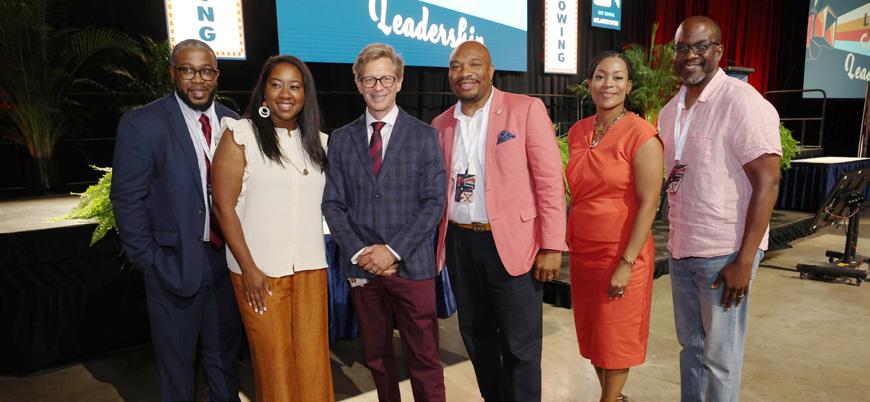


The 2025 CLAS Convention, held June 8–11 in Mobile, Alabama, brought the spotlight to Alabama’s education leaders with the dynamic theme “Lights, Camera, Leadership.” Attendees were energized by powerful keynotes from Steve Pemberton, Weston Kieschnick, and Jasmine Guy, each bringing unique insight, inspiration, and impact to the stage. From transformative sessions and packed exhibit halls to red carpet photo ops and rich networking moments, the convention delivered a blockbuster professional learning experience. Be sure to catch the next showing - plans are already underway for the 2026 CLAS Convention!





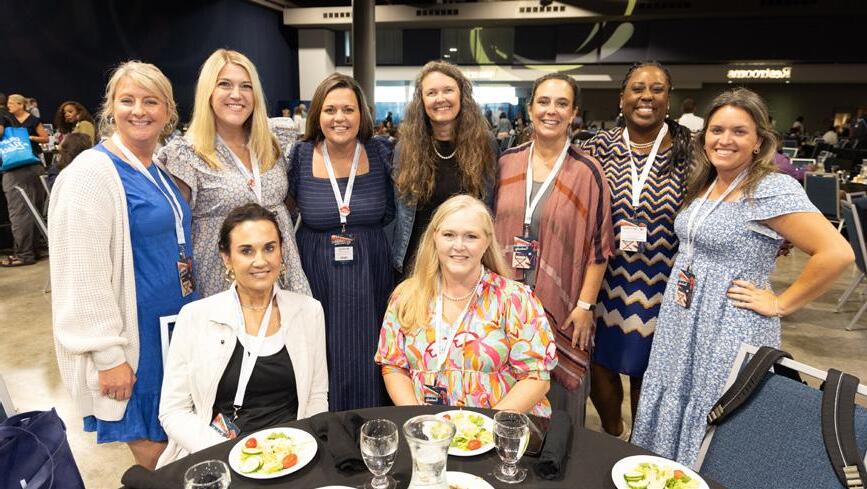
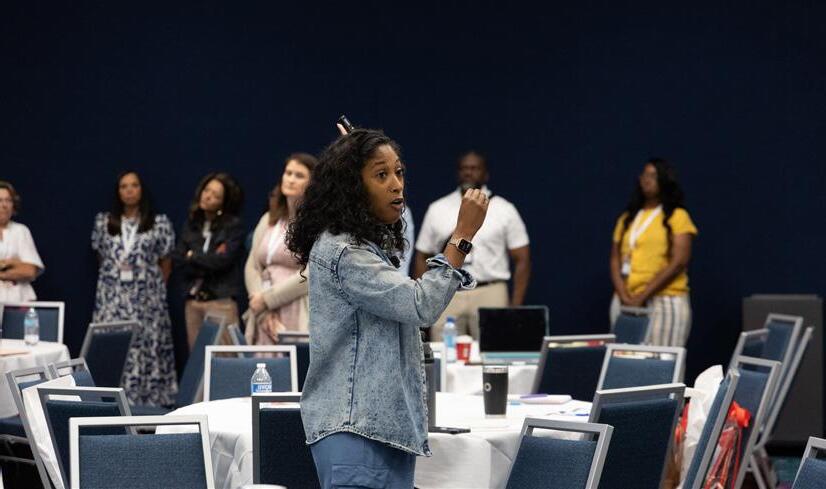
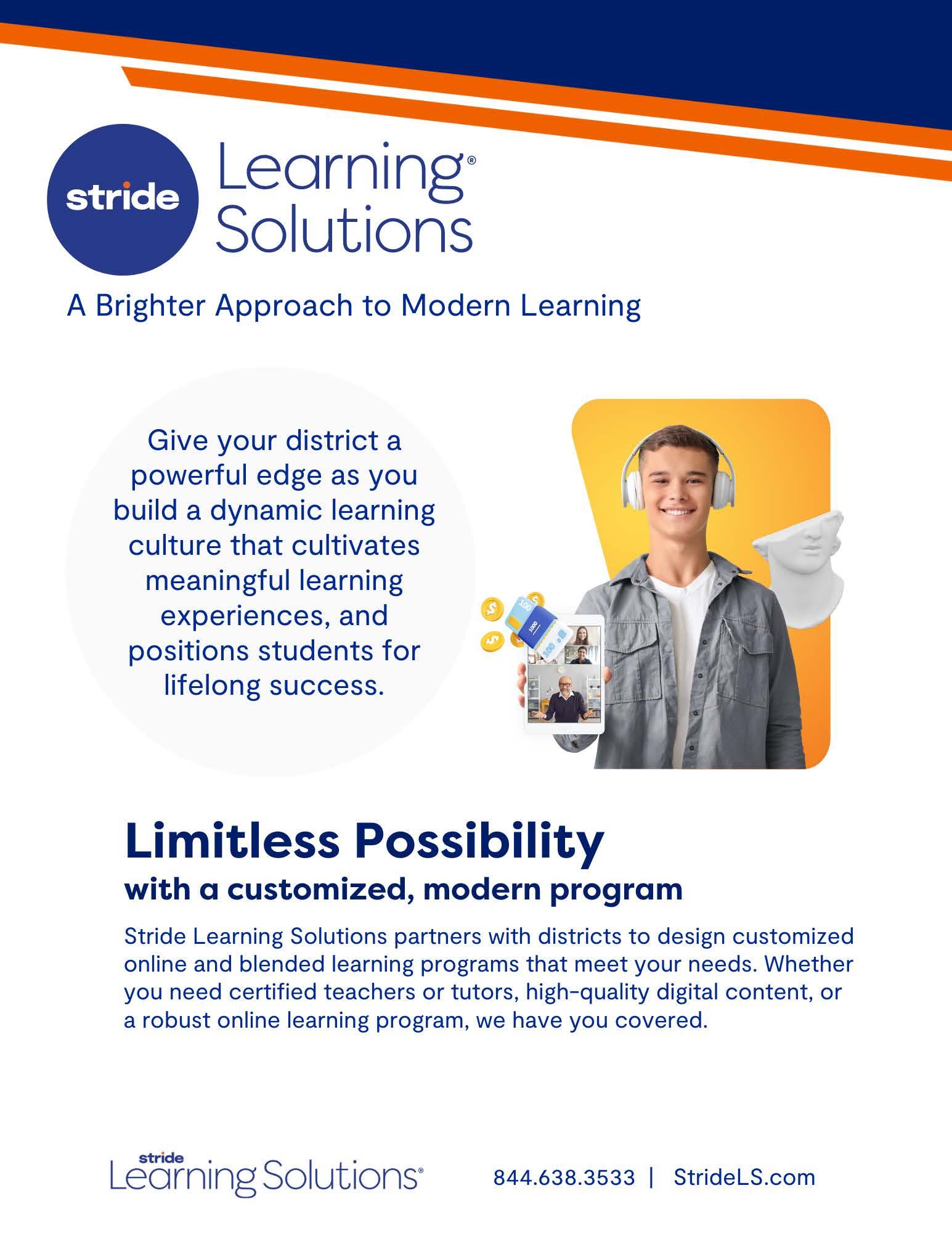
high school diploma with ACCS. Participating students do not count against their high school’s dropout rate. Effective 6/1/2025.
• Blue card changes for military students (SB59/ Act 2025-47). Parents of military dependents can now present military vaccination records in place of Alabama immunization cards for school enrollment.
• Updated AED placement requirements (HB416/Act 2025-347): Schools are now required to have an AED at athletic venues and athletic practice facilities when they are in use. Legislation in 2024 requires a cardiac arrest plan to be in place at every public and private K-12 school and also updated the health curriculum for public secondary schools to require AED training and hands-on CPR instruction (Act 2024-392, Act 2024-114).
Once a bill is signed into law by the Governor, it becomes the responsibility of the local superintendent and board of education to review the legislation to align board policy and the student code of conduct accordingly.
However, we know that policy alone is not enough. Without clear procedures, policies often fall short in practice. Ideally, district leadership will assemble a team to develop implementation procedures, provide guidance for educators, and design a training plan for all staff responsible for enacting the changes at the school level.
Consistency is essential. All stakeholders must operate from a shared understanding of key terms and processes, and those must be applied uniformly across the district.
School leaders also play a critical role in communicating expectations to students and families. Research shows that people need to hear a message multiple times—typically between two and seven—before it sticks. In a world of competing communication channels, relying on a single method isn’t enough. School and district leaders should work together to create a multi-pronged communication plan to ensure families and staff are fully informed of all changes.
Over the next few months, take time to connect with your state legislators (find their info here). If they don’t already know you, introduce yourself and let them know which school and system you represent. Check in every few weeks with updates—both successes and challenges. You
know your school best, and legislators need to see you as a trusted source for education insight.
When legislators understand the real needs in their schools—and know those ETF budget requests represent students, not just numbers—they’re in a stronger position to advocate for funding.
My role is to be the first, but not the only, voice legislators hear on education issues. For that voice to carry weight, it needs your support. Every CLAS member should be engaging with lawmakers about what’s best for students. Our advocacy team can provide legislators issue briefs and talking points, but only you can explain what a bill means for the students in the legislator’s district. If questions come up that you can’t answer, send them my way—I’m here to support you, too. Whether you need more information or have ideas for legislation, I’m just a call or email away.
CLAS will host Advocacy Days during the legislative session for each affiliate at our office in Montgomery. You’ll get a morning briefing, then we’ll head to the State House to attend committee meetings and speak with legislators. We’ll regroup afterward over lunch to share what you heard and plan what we need to do next. These days are also a chance to give feedback to the CLAS team on how proposed laws could affect your schools.
As a former teacher, I know it’s tough to leave campus— but showing up in person makes a lasting impact. Your voice matters.
Lots of bills did not pass this session! Some of these bills have already been pre-filed for the 2026 session.
• Requiring the AHSAA to change how it counts students based on a student’s EL status
• Banning drag shows in public libraries and public school libraries
• Criminalizing library books
• Posting the Ten Commandments in the classroom
• Requiring the Pledge of Allegiance and prayer over the PA system every day
• Requiring schools to install panic alert button systems
• Creating a high school NIL framework
• Requiring local boards to adopt a policy allowing release time for religious instruction
View the status of all legislation CLAS tracked in 2025 here
The NAESP Pre-K-3 Leadership Academy™ is a yearlong program designed to promote and build the capacity of principals and program directors to lead Pre-K-3 communities. The NAESP Pre-K-3 Leadership Academy™ is provided in partnership with CLAS and the Alabama Department of Early Childhood Education. The NAESP
Pre-K-3 Leadership Academy™ has been offered in Alabama since 2017.
A dedicated team of experienced Pre-K-3 advisors helps provide mentorship and guidance to participants throughout the year. The 2024-2025 cohort advisors were Paula Bruno, Tanya Guin, Waller Martin, Dena Mayfield, Haley Moore, Kara Scholl, Camille Wright, and Tracey Wray.
The following NAESP Pre-K-3 Leadership Academy™ participants were recognized at the 2025 CLAS Convention during the Awards Luncheon on June 10, 2025.
Paul Agnew
Nan Gray Davis Elementary
Mobile County
Amy Atkins
Carbon Hill Elementary
Walker County
Jonathon Barron
Union Hill School
Morgan County
Nicholas Bolding
Brindlee Mountain Primary
Marshall County
Kelia Browder
Union Springs Elementary Bullock County
Merideth Buzbee
Sumiton Middle
Walker County
Margaret Collins
West Smiths Station
Elementary
Lee County
Heather Collum
Sheffield City Schools
Julie Cordell
Robert D Sloman Primary
Marshall County
Janice Drake
Charles A. Brown Elementary
Birmingham City
Shana Ervin
Jackson-Steele Elementary Lowndes County
Amelia Evans
Madison Cross Roads Elementary
Madison County
Julie Flippo
W.A. Threadgill Primary
Sheffield City
Tina Garst
Faine Elementary
Dothan City
Cheritta Hayes
McCalla Elementary
Jefferson County
Emily Herbert
New Brockton Elementary
Coffee County
Dalton Holyfield
Southern Choctaw Elementary Choctaw County
Kristi Hopper
Boaz Elementary
Boaz City
Antonia Ishman
Booker T. Washington K-8
Birmingham City
Chakema Jackson
Rocky Ridge Elementary
Hoover City
Michelle Jones
Curry Elementary Walker County
Kristi July
Covenant Academy of Mobile
Laura Lamb
Barkley Bridge Elementary
Hartselle City
Warren Lewis
Hemphill Elementary
Birmingham City
Lisa Long
Huffman Academy
Birmingham City
Nicholas Looney
Athens Elementary
Athens City
Amy Lowe
Chickasaw City Schools
Jessica Norwood
G.W. Trenholm Primary Tuscumbia City
Stephanie Parker Huffman Academy Birmingham City
Ryan Roberson
Lauderdale County Elementary Lauderdale County
Tiffany Scissum Brewbaker Primary
Montgomery County
Cilia Smith
Kate D. Smith DAR Elementary Marshall County
Sheneta Smith
Howell-Graves Preschool
Muscle Shoals City
Matthew Syesta
W.A. Threadgill Primary Sheffield City
Michele Thomason West Smiths Station Elementary Lee County
Marc Tracy
Haleyville Elementary Haleyville City
Ashley Uhrig
Good Hope Primary Cullman County
Kendra Walker
Parkside Elementary Cullman County
Chandra Watkins
West End Academy
Birmingham City
Marcus West
Sumter Central High Sumter County
Kimberly Williams
Saraland Early Education Center
Saraland City Schools
Barry Wilson
Sumiton Elementary Walker County Schools

For the first time in the history of the CLAS Leadership Award, two recipients have been honored at the 2025 CLAS Convention. This prestigious award recognizes exemplary school and district leaders for their outstanding service, leadership, and contributions to public education in Alabama. A committee of CLAS Board of Directors members, unable to break a tie in judging, selected Dr. Karissa Lang of Hartselle City Schools and Mr. Keith York of Opelika City Schools as this year’s co-recipients.
Dr. Karissa Lang, Principal of Crestline Elementary School, is the nominee representing the Alabama Association of Elementary School Administrators (AAESA). A member of CLAS since 2010 and AAESA since 2013, Dr. Lang has served in numerous leadership roles, including AAESA President, and has represented the affiliate on the CLAS Board of Directors. She is nationally and locally recognized for her achievements, including being named the 2023 National Distinguished Principal and leading Crestline Elementary to its designation as a 2024 U.S. Department of Education National Blue Ribbon School. A National Board-Certified Teacher and CLAS Certified Instructional Leader, Dr. Lang is also actively involved in her community, serving on the Hartselle City Steering Committee and her church’s leadership team.
Mr. Keith York, Director of Human Resources for Opelika City Schools, is the nominee representing the Alabama Association of Middle School Principals (AAMSP). A veteran educator, Mr. York has served as teacher, coach, assistant principal, principal, and now district leader. He spent many years as principal of Opelika Middle School, where he became known for his servant leadership, deep compassion, and impact on the school community. Twice named Alabama Middle School Principal of the Year, Mr. York currently serves as AAMSP President for 2024–2025, and has long played a key role in strengthening the organization’s reach and relevance. His peers describe him as a leader who “elevates everyone around him,” and his dedication to students, faculty, and school leaders across the state is widely respected.
The CLAS Leadership Award is sponsored annually by Horace Mann, a longtime CLAS partner dedicated to supporting educational excellence. At the 2025 convention, representative Yahrasiel Colbert presented $500 checks to
each recipient, honoring their leadership and outstanding contributions to Alabama education.
Congratulations to Dr. Karissa Lang and Mr. Keith York on this well-earned recognition. Their impact on students, educators, and communities across the state is a powerful example of leadership in action.
Floyd Collins
Alabama Association for Prevention, Attendance and Support Services (AAPASS)
Seth Taylor
Alabama Association of Secondary School Principals (AASSP)
Eryn Thrash
Alabama Child Nutrition Directors (ACND)
Dr. Justin Hefner
Alabama Association for Supervision and Curriculum Development (AASCD)
Phillip Hazelrig
Alabama Association of School Personnel Administrators (AASPA)
Dr. Walter Gonsoulin
School Superintendents of Alabama (SSA)
Angela Bonds
Alabama Council of Administrators of Special Education (ALA-CASE)
Dr. Richard Templeton
Alabama Association of 504 Coordinators (ALA504)
Dennis Duncan
Alabama Association of Career/Technical Administators (ACTA)


Johnny Taylor has been named the recipient of the Dr. James A. Street Award at the 2025 CLAS Convention Awards Luncheon, one of the highest honors presented by the Council for Leaders in Alabama Schools (CLAS). This award recognizes individuals who have demonstrated exceptional service and unwavering commitment to public education and educational leadership in Alabama.
With over 30 years of service as both a teacher and administrator, Mr. Taylor’s legacy is deeply rooted in the lives of students, educators, and communities across the state. For 19 of those years, he served as principal of Red Level High School in Covington County, where his steady, student-centered leadership brought growth, structure, and a culture of high expectations to the school community.
A servant leader in every sense, Mr. Taylor’s influence extended far beyond the school building. He held numerous leadership positions within the Alabama Association of Secondary School Principals (AASSP) and was elected by his peers to serve as the 2001 CLAS President, a role that underscored the statewide respect and admiration he earned throughout his career.
His actions consistently reflected the core values of the Dr. James A. Street Award: professionalism, compassion, and selfless service. One particularly memorable example came when a fellow administrator, Keith York, faced the sudden passing of his school’s principal. Without hesitation or fanfare, Mr. Taylor drove nearly an hour from his own

district and was the first to arrive Monday morning, simply to check in and offer his support. It was a quiet, powerful gesture that spoke volumes about his character—and left a lasting impact.
Johnny Taylor is the kind of educator who makes everyone around him better. His lifelong dedication to supporting educators, nurturing students, and uplifting entire school communities exemplifies the spirit of this award. As former CLAS Executive Director Dr. Vic Wilson noted, “Johnny Taylor’s steady leadership and servant’s heart are what Alabama education is all about. We are proud to recognize him with the Dr. James A. Street Award.”

Dr. Mark Sullivan, Superintendent of Birmingham City Schools, has been honored with the 2025 Little Red School House Award at the CLAS Convention. This award celebrates innovative programs that significantly enhance educational opportunities for Alabama’s students. Dr. Sullivan was recognized for his visionary leadership in launching Intersession: The Pathway Forward, a groundbreaking academic recovery and enrichment initiative.
The Birmingham City Schools (BCS) intersession program has attracted national attention from The New York Times, NBC Nightly News with Lester Holt, and Forbes for its effective and creative approach to post-pandemic learning challenges. Held during traditional school breaks, these intensive instructional sessions offer students additional learning time in key subjects such as reading, math, science, social studies, and ACT preparation.
Through this model, students have access to up to 30 extra instructional days each year, roughly the equivalent of six additional weeks of learning. The program was designed by Dr. Sullivan to support academic recovery without changing the traditional school calendar. It provides targeted academic reinforcement, helps strengthen foundational skills, and offers engaging enrichment opportunities that motivate students to participate.
The program’s popularity continues to grow, with more than 7,000 students attending the most recent fall intersession. “That’s 7,000 students in school, learning when they don’t have to be,” Dr. Sullivan said proudly. Beyond academics, the intersessions include a wide range of activities such as dance, robotics, wellness, coding, E-sports, career and technical education explorations, ACT prep, and Advanced Placement prep.
The results speak for themselves. Birmingham City
Schools has seen measurable improvements in student achievement: 86 percent of third graders earned a passing score in reading, math proficiency rose by 3 percent, and more schools moved into the A and B performance categories. Perhaps most striking, the number of schools receiving an “F” grade dropped by 46 percent.
Dr. Sullivan’s leadership has transformed a moment of crisis into a model of innovation and opportunity. His work through the intersession program exemplifies the purpose and spirit of the Little Red School House Award.


The A+ Best Practices Center (ABPC), in partnership with the Alabama State Department of Education, facilitates high-quality, collaborative professional learning for Alabama educators.
Dr. Stoney Beavers (205) 908-0059 dakota@aplusala.org aplusala.org/best-practices-center/
At Accelerate Learning our award-winning interactive STEM programs are designed to engage students’ natural inquisitiveness, turning questions into exploration and exploration into understanding.
Margaret Rebman (901) 299-4906
mrebman@acceleratelearning.com acceleratelearning.com
ACCESS Virtual Learning is an education initiative of ALSDE that provides opportunities and options for Alabama public school students in AP, core and elective courses.
Carolyn Harvey (256) 774-4609
cdharvey@madisoncity.k12.al.us https://www.madisoncity.k12.al.us/ Domain/21
ACE Sports offers the best in video boards, scoreboards, audio and production equipment for every sport across North America.
Jason Hall (251) 802-5914 jason.hall@acesports.com www.acesports.com
ABC’s Alabama solutions fully align with state standards, preparing students for ACAP success and guaranteeing score improvement.
Lindsey Cohn (888) 264-5877
alabama@abck12.com https://americanbookcompany.com/
We offer benefits strategies to empower you to make benefits decisions that help your organization and your employees.
John Cole (334) 220-7605
john.cole@americanfidelity.com www.americanfidelity.com
The American Village serves the nation as an educational institution whose mission is to strengthen and renew the foundations of American liberty and constitutional self-government.
Natalie Steed (205) 665-3535
nsteed@americanvillage.org https://www.americanvillage.org/
Amplify.
Bailey Education Group
Bailey Education Group is committed to partnering with all schools and districts to improve the lives of all children through customized PD and teacher coaching.
Bill Hopkins (281) 235-8246 info@baileyarch.com http://baileyeducationgroup.com/
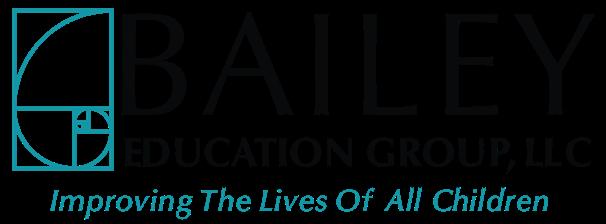
Bchex, a BIB Company
Faster Screening. Safer Workplaces. Stronger Teams. Our platform simplifies the entire volunteer background screening process, making it seamless and stress-free for you and your volunteers.
Michael Kinard (980) 622-7901 mkinard@bib.com https://www.bib.com/
Bill Miller Photographers
Family owned and operated since 1955, we specialize in school and senior portraits while helping schools fundraise and support their communities.
Abby Miller Mattox (256) 892-3150 hello@billmillerphotographers.com www.billmillerphotographers.com
Black & White Photography Inc.
Chasity O’Quinn (865) 599-5101 cquinn@amplify.com www.amplify.com
Arkansas State University








Mary Werneth (251) 330-5384
mary.werneth@risepoint.com https://bit.ly/AStateRequestInfo_MW




A pioneer in K–12 education since 2000, Amplify is leading the way in next-generation curriculum and formative assessment.
Pre-school to high school photography service. Yearbooks, PowerSchool data provider sports banners, cap and gown vendor, custom printing services.
Ricky White (205) 714-3000
blackandwhitephoto.inc@gmail.com mybwpdc.com
Blue Ribbon Schools of Excellence
BRSE is a one-of-a-kind assessment that provides actionable insights that can be used for school improvement. It is a comprehensive approach to helping schools grow.
CREATED BY TEACHERS FOR TEACHERS A-STATE ONLINE. A-State, ranked among the best by U.S. News, offers flexible, accelerated online programs for educators with multiple starts.
April Stansberry (256) 339-2153 april@blueribbonschools.com https://blueribbonschools.com
Capturing Kids’ Hearts
Capturing Kids’ Hearts® empowers educators through training, coaching, and a character-focused curriculum to enhance social-emotional wellbeing, build relationships, foster campus culture, and strengthen student connectedness.
Rob Kirk (979) 575-4944
rob.kirk@capturingkidshearts.org www.capturingkidshearts.org
Cognia is a non-profit, non-governmental organization that equips primary and secondary schools throughout the United States and internationally in the journey of continuous improvement.
Jeff Langham (334) 312-2432
jeff.langham@cognia.org www.cognia.org
Columbia Southern University
Columbia Southern University offers 100% online associate, bachelors, masters and doctoral degrees in fields such as, education, nursing, business administration, and many more!
Ernie Smith (251) 923-4055 ernie.smith@columbiasouthern.edu www.columbiasouthern.edu
Curriculum Associates
Curriculum Associates research-based products including i-Ready® and Ready®, provide teachers & administrators with flexible resources that deliver meaningful assessments and data-driven, differentiated instruction for children.
Kelly-Ann Parson M.Ed. (205) 949-7744 KParson@cainc.com https://www.curriculumassociates.com/
DataComm Networks Inc. (MSP) provides IT and security solutions in Alabama, specializing in managed services like network design, security monitoring, firewall management, and helpdesk support.
Cody Boyer (800) 544-4627 cboyer@datacomm.com www.datacomm.com
Edmentum
Edmentum creates learning technology solutions designed to support educators and supplement existing curriculum with one goal in mind: positive student outcomes in K-12.
Dee Dee Jones (256) 221-0807 deedee.jones@edmentum.com www.edmentum.com
Gibbs Smith Education
We are an independent, employee-owned publisher committed to making an ethical difference in the world of public education.
Jeff Whorley (801) 927-2172 jeff.whorley@gibbs-smith.com gibbssmitheducation.com
Provider of playground equipment, First Class Pre-K equipment, shade, swings, surfacing, and site furnishings since 1981. Our playground equipment is proudly manufactured in Alabama!
Angela Collins (205) 706-3993 playgrounds@hammill.net www.hammill.net
For over 50 years, thousands of schools and districts across the country have relied on our high-quality, hands-on materials to expand their core curriculum.
Mandi Boyd (847) 230-9945 mboyd@hand2mind.com hand2mind.com
Horace Mann Companies
Horace Mann offers auto, home, life, and voluntary insurance as well as retirement strategies and financial wellness education for educators and their families.
Yahrasiel Colbert (470) 493-7146 association.relations@horacemann.com https://www.horacemann.com
Imagine Learning provides digital-first, personalized educational solutions for K–12, offering programs in literacy, math, language, and social studies to enhance student success.
Anissha Officer (205) 962-0513 anissha.officer@imaginelearning.com imaginelearning.com
Take teaching and learning to the next level with Canvas, the #1 educational software, and the foundation of the Instructure Learning Platform. Christopher Downs (781) 831-4816 cdowns@instructure.com instructure.com
iteach
iteach is an alternative teacher certification program that provides a flexible, affordable pathway for individuals to earn teaching credentials and enter the classroom quickly.
Asha Caldwell (817) 973-2336 asha.caldwell@iteach.net https://iteach.net/
SchoolsPLP offers over 2000 PreK - 12 aligned online courses. The course offerings include core, electives, credit recovery and CTE pathways.
Eric Moon (770) 789-1941 eric@jnreducation.com SchoolsPLP.com
Empowering teachers and students of all ability levels to gain the MOST improvement in the LEAST amount of review time on high-stakes Alabama assessments.
George Kushner (251) 604-4208 gkushner@jumpstarttestprep.com www.jumpstarttestprep.com
Accelerate reading achievement with 750+ decodables mapped to a rigorous phonics progressions in English and Spanish.
Matt Smith (770) 402-2423 matt.smith@justrightreader.com https://justrightreader.com/
K12 Skills Arcade is a game-based learning platform for Pre-K–12, offering adaptive, standards-aligned practice in math, reading, and science with real-time progress tracking.
Tamra Lanning (423) 715-7331 tlanning@k12.com schools.learninghub.com/k12-skills-arcade/
We do onsite engraving on sterling silver jewelry.
Karen Maury (205) 790-8349 kayrena16@gmail.com
Integrated daily school safety solution including dismissal/carline management, visitor/staff/student/ volunteer management, emergency management, hallpass management, and event day management. Kim Robertson (800) 578-1448 krobertson@kidaccount.com https://kidaccount.com/
Kids First Education is an educational solution provider with a dedicated Alabama team partnering with districts through collaboration, creation, and commitment to putting Kids First!
Shannon Uptain (601) 765-5437 info@kidsfirst.llc www.kidsfirst.llc

Lathan McKee Architects
Lathan McKee Architects is a full‐service design firm offering a comprehensive range of services with experience including projects of varying size, style, complexity, and scope.
Barry Davis (205) 988-9112 bdavis@lathanassociates.com www.lathanassociates.com
We have a range of solutions to meet your needs - from site furnishings to shade structures and everything in between.
Jeff Wingo (800) 459-7241
info@playworldpreferred.com www.playworldpreferred.com
PowerSchool is a leading provider of cloud-based software for K-12 education in North America. Learn more at www.powerschool.com.
Publishers’ Warehouse is Alabama’s one-stop shop for instructional materials. Our partnership with schools & the ALSDE allows us to provide textbooks with ZERO shipping charges!
Patrick Chappell (205) 516-5821 pchappell@ebsco.com publisherswarehouse.com
Reach is the nation’s only non-profit accredited university fully dedicated to championing the Apprenticeship Degree an affordable path for working adults to gain a degree.
Heath Grimes (256) 565-8425 hgrimes@reach.edu reach.edu
Real Deal Gaming provides the ultimate entertainment experience. We offer exciting ways to reward students for good behaviour, testing well on ACAP and much more.
Darryl Hughley (256) 504-7169
RealDealGamingExperience@gmail.com www.realdealgaming.com
Legacy of Hope
Legacy of Hope saves lives through organ/tissue donation, honors the legacy and generosity of donors, and supports donor families in their time of need
LaToya Bishop (205) 731-9200
LaToyaRBishop@legacyofhope.org legacyofhope.org
Learning Blade - Powered by eDynamic Learning
Learning Blade is a free STEM and career awareness platform that helps students explore real-world careers and build academic skills through interactive, standardsaligned online missions.
Scott Mains (205) 937-2841 scott@learningblade.com www.LearningBlade.com/AL
LEGO Education
As the builders of tomorrow, students hold the future in their hands. We believe that every student deserves access to quality, hands-on learning experiences!
Sonya Glasper Burden (770) 367-7773
SONYA.GLASPER@LEGO.COM www.LEGOeducation.com
Pearson Education Inc
Educational materials and services.
Brady Svec (984) 229-1420 brady.svec@pearson.com pearson.com
Patty Garnto (877) 873-1550
sales@powerschool.com https://www.powerschool.com/
PowerUpEDU, a technology solutions provider for Alabama classrooms, creates transformational learning environments that engage students and empower teachers, bridging the gap between teaching and technology.
Shoney Brice (888) 517-3824 shoney@powerupedu.com https://powerupedu.com/
Presence is a leading provider of teletherapy. We innovate how clinicians address student special education and mental health needs through an elevated approach to teletherapy.
Lauren Easley (205) 269-9000 lauren.easley@presence.com presence.com
The ColorPro poster makers allow you to create your own full-color posters and banners. Also, create your own custom award plaques, cutouts, decals and more!
Steven Sanders (800) 280-7809
steven@presentationsolutions.com www.presentationsolutions.com
Really Good Stuff offers educational products and resources for teachers, focusing on classroom supplies, learning tools, and creative solutions to enhance engagement and learning outcomes.
Kristen McGaw (979) 402-2373 kmcgaw@discountschoolsupply.com www.reallygoodstuff.com
Renaissance is a global leader in assessment, reading, math, and early literacy solutions for pre-K–12 schools and districts.
Lori Boyd (334) 649-3345 leigh.twigg@renaissance.com https://www.renaissance.com/
A mission-led strategic branding and marketing agency exclusively serving K-12 education, Rhodes Branding empowers schools with innovative strategies to flourish in a dynamic, competitive environment.
Molly McGowan Gorsuch (888) 659-9333 hello@rhodesbranding.com www.rhodesbranding.com
Ripple Effects is an evidenced-based suite of digital programs, for students in Pre-K through grade 12, offering personalized skill building on behavioral and social challenges.
Kate Wise (888) 259-6618
kwise@rippleeffects.com https://rippleeffects.com/about-us/
Riverside Insights
We offer strengths-based assessments that unlock the potential in all learners. Our industry leading resources transform results into strategies for success.
Kevin Burke (440) 773-8252 kevin.burke@riversideinsights.com riversideinsights.com
Samford University School of Education
Samford University School of Education Graduate Programs.
Marcie Harchuck (205) 726-4337
mjparson@samford.edu https://www.samford.edu/ad/graduate-admission/
SchoolAI
SchoolAI empowers educators to personalize learning with engaging, accessible experiences. We save time, transform challenges into opportunities, and help every student thrive.
Matt Argubright (913) 710-8762 matt@schoolai.com www.schoolai.com
Scholastic Education
Scholastic is the largest publisher and distributor of children’s books, a leading provider of core literacy curriculum and professional development services and children’s media.
Lee Getzinger (205) 209-2406 lberlin@scholastic.com www.scholastic.com
Smart Solutions Group
Through a variety of curricula options, Smart Solutions Group’s products and services are designed to prepare students for academic, college, career, and lifelong success.
Josh McCullough (251) 654-4825 info@smartsolgrp.com www.smartsolgp.com
SmartLab
SmartLabs turnkey, career-centered STEM programs equip today’s students for tomorrow’s challenges. Every PBL environment integrates STEM applications across industry pathways to create real career connections.
Pamela Drescher (770) 539-0901
pam.drescher@creativelearningsystems.com www.smartlablearning.com
A professional development company dedicated to supporting educators in their efforts to improve student learning. Known for its focus on collaborative professional learning communities (PLCs).
Kat Natour (865) 556-0575
kathy.natour@solutiontree.com www.solutiontree.com
Strawbridge Studios, Inc.
Leading provider of school day portraits, senior portraits, sports portraits, special events portraits, and yearbooks. We believe honest value never fails.
Todd Diefenderfer (334) 301-3562
todd.diefenderfer@strawbridge.net www.strawbridge.net
Studies Weekly is a standards-based core curriculum for K-8, founded on deep learning strategies in Social Studies, Science, and Health & Wellness.
Josh Hadden (866) 311-8734
marketing@studiesweekly.com StudiesWeekly.com
Educational solutions company for over 65+ years offering simulators, hands-on skill sets, totally autonomous programs, machining, 3D printing scanning, pre-engineering, STEM, elearning, and many more.
Bobby Conrad (205) 936-1485
bobby@ttaweb.com www.ttaweb.com
Terrell Enterprises, Inc.
We offer high-quality products such as Sico, Artcobell, Fomcore, and COE Distributing; as well as services such as space planning, design, delivery, installation, and repair.
Al Brannon (334) 382-7415
purchasing@terrellenteprises.com
https://www.terrellenterprises.com/
The Hope Institute
Hope Leadership Academy is a three-year program that enables educators to create strategies that develop a school culture of character development.
Liz Huntley (205) 901-6323
info@hopeinstitute.org
https://www.hopeinstitute.org/
The Kirkland Group provides job-embedded teacher coaching and professional development services to K-12 schools specializing in ELA, math, science, and history.
Chan Cleveland (601) 206-5505 info@kirklandgroup.org www.kirklandgroup.org
The University of Alabama
M.A. in Educational Leadership (online); EdS in Educational Leadership (online); Ed.D. in Educational Leadership (online); Ph.D. in Educational Leadership; Ph.D. in Educational Leadership (online).
Benjamin White (205) 348-6997 bkwhite2@ua.edu https://education.ua.edu/
The University of Alabama Online offers over 30 topranked graduate education degrees with affordable tuition so you can earn your degree around your schedule.
Hannah Homan (205) 348-0089 online@ua.edu online.ua.edu/clas
Peer Helpers PLUS, an evidence-based K-12th grade prevention and support program, equips students to navigate a wide range of emotional, societal, and behavioral challenges.
Ruby McCullough (844) 705-1981 ruby@thriveway.com www.thriveway.com
Using TouchNumerals and TouchPoints with TouchMath’s explicit and systematic math instruction allows students to see, touch, say, and hear math in a whole new way.
David Constantine (251) 545-9903 dconstantine@touchmath.com www.touchmath.com
Transfr builds classroom-to-career pathways for millions of workers who are the future of every industry via immersive technologies and in partnership with schools, businesses, & governments.
Kaitlyn Alderman (251) 635-5812 kebert@transfrvr.com www.transfrinc.com
Trubrand Group
Formerly Transaction Point. Campus Branding Products: Logo Mats, Apparel and Staff Gifts.
Britt Matthiessen (800) 396-7301 jbm@trubrandgroup.com trubrandgroup.com

TURNERBATSON is a thriving architectural & interior design firm located in Birmingham, Alabama. The firm has a 101-year history and a diverse client base. Melissa Anderson (205) 403-6201 manderson@turnerbatson.com turnerbatson.com
Advance your career with an online degree from UWA. Flexible, affordable programs and extra savings with the Teacher Connect Scholarship help you achieve your goals.
Jessica Hughes (205) 533-0131
jhughes@uwa.edu online.uwa.edu
Solution provider through Sport and Spirit to elevate student experience and define your culture!
Verkada offers security cameras, access control, environmental sensors, alarms, visitor management, and intercoms on one cloud-based platform. Over 28,000 companies and organizations worldwide use Verkada.
Austin Baker (704) 962-7524
austin.baker@verkada.com verkada.com
Virco Manufacturing
Virco is celebrating their 75th year as America’s largest manufacturer of classroom, library, and cafeteria furniture for schools.
For an appointment, call 205-721-0514.
John Havicus (205) 721-0514
johnhavicus@virco.com www.virco.com
ULMonroe Online
University of Louisiana Monroe’s Online Doctoral and Master’s programs for educators. With affordable pricing, no GRE options and even a no-dissertation option! Talons Out!
Brandi Paine (225) 218-7390 brandi.paine@risepoint.com online.ulm.edu/brandi
Andrew Bush (601) 540-3926
abush@varsity.com www.varsitybrands.com
Ward Scott Morris Architecture
Ward Scott Morris Architecture has 40 years of experience designing the future of K-12 today. Creating partnerships that focus on our clients needs.
Carol Coleman (205) 577-7027
carol@wardscottmorris.com www.wardscottmorris.com
Zaner-Bloser develops curriculum resources to teach foundational literacy and math skills to grades PreK–6 students. Our resources help teachers inspire more “aha” moments.
Jessica Wright (334) 590-6494
jessica.wright@zaner-bloser.com www.zaner-bloser.com


You have some amazing benefits with your CLAS membership. Don’t lose them. Renew today!

Benefits for all memBers:
• Discounts on professional learning activities sponsored by CLAS
• Access to CLAS communications and updates
• The quarterly magazine, CLASSchoolLeader
• Complimentary subscription to The Main Idea, a monthly email newsletter with book summaries on the latest education-related books.
• Access to membership directory online
• Access to CLAS job bank
• Access to networking opportunties
• Discounts on insurance through Horace Mann Companies
additional Benefits for Individual and Institutional memBers
• Legal defense fund
• Legal counsel, information, and support
• Contract review service visit us online at www.clasleaders.org/membership